The











ported Muslim population [as] one of relentless attacks from their population against ours — coming in the way of terrorism, general street violence, ethnic displacement and of course, grooming gangs […] which everyone knows is a cute term for the mass racially targeted rape of young English girls.”
ATALK hosted by Freedom Society featured numerous Islamophobic comments, as revealed in a recording provided anonymously to Exeposé
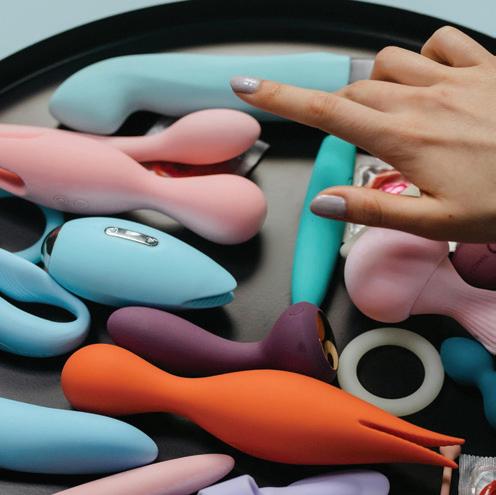
The talk, entitled “Two Tier Policing: Injustice Unveiled” was delivered by a former student and current University of Law student in Exeter. The talk, held on the 10th October 2024, covered policing of the summer riots and offered far-right perspectives on immigration and race.
During the speech, the speaker labelled immigration as the “ethnic displacement” of the white English population by Muslims, saying “they’re literally replacing us in our own country. We’re being genocided.”
Last summer, following the murder of three girls in Southport, violent and racist anti-immigration protests broke out across the country, fuelled by online misinformation that the murderer was a Muslim immigrant, a fact that was disproved by the time of the Freedom Society talk.
Later in his speech, the student described “the history between the native English population and the im-
He then labelled white English people as “a disprivileged native population who don’t even have the right to collectivise and defend themselves,” before characterising the riots as “natives essentially rebelling against their displacement.”
He said a “refreshing” aspect of the summer riots was how they allowed “the ethnic divisions [that] we know are there … to come to the surface.” He also criticised multiculturalism, saying it was “rooted in the idea that white people have it coming to us.”
The end of the presentation was met with a round of applause and followed by a question and answer session, where many questioners praised the talk. When asked how he would handle policing, the speaker replied that if he were in charge, “there would be no minorities to police.” This comment was met with laughter from the crowd.
Freedom Society describes itself as “right-wing students […] dedicated to promoting free speech and uncensored political discourse.” They host weekly off-campus events featuring talks from students and external speakers.
When approached for a comment, Freedom Society told Exeposé, “Freedom Society supports the right to free speech as a core principle of our organisation. We have no ‘party line’ and speakers voi-
ce their own opinions, therefore we neither condone nor condemn statements made at our events. Freedom Society invites those who take issue with unorthodox ideas to attend our events and challenge them as part of the discussion.”
The speaker told Exeposé, “it is possible that a few comments and jokes which were made may have crossed the line of political correctness. But the overall purpose of the speech was to address serious injustices and atrocities which are taking place in British society today. In my view, it is far preferable to discuss these issues in a politically incorrect manner than not at all.”
A spokesperson for the University of Exeter described the comments as “deplorable”, but said that they “trust the Students’ Guild to investigate the staging of this event, and the subsequent reports that have been made. They further added, “we are clear that the University supports and protects the right to freedom of speech and expression, so long as this is within the law. We are equally clear that there is absolutely no justification or place for any type of discrimination, hate speech or harassment within our community. We are committed to taking all appropriate action to ensure our campuses and community are
both safe and welcoming for everyone.”
When Exeposé brought the comments to the Guild in November, they initiated an investigation, and this article was withheld until its conclusion. Following the investigation, the Guild have decided to take no disciplinary action.
The speaker remains, at time of publication, on the committee of another Guild-affiliated society.
They said, “following concerns raised by some students regarding the expressed views at the event by the speaker, we launched an investigation. The scope of the investigation focused on the society’s conduct — whether appropriate external speaker processes were followed and ensuring appropriate risk management.
“Whilst the investigation did consider the views expressed by the speaker at the event, the speaker themselves does not fall within the scope of our Members’ Code of Conduct. The investigation has concluded with recommendations around improving Freedom Society’s processes which we’re supporting them with.”
They added, “as your Students’ Guild, we support freedom of speech. We want to foster an environment where our members can participate fully, feel able to question and challenge, express new ideas, discuss controversial opinions within the law all without fear of intolerance or discrimination. We equally believe that there is no place for hate in our community. The role of the Guild is to facilitate lawful free speech through the organisation of student-led groups events and activities.”
If you have been affected by this content please contact wellbeing at wellbeing@exeter.ac.uk or 01392724381.
Editors
Print: Gracie Moore and Amy Rushton
Online: Callum Martin and Katie Matthews
Print Deputies: Charlie Gershinson, Rosie PetersMcDonald, Agata Koralewska
Online Deputies: Emily Roughton and Amberly Wright editors@exepose.com
News Editors
Print: Isabella van der Putten and Nina Exton
Online: Eva Holland and Anvi Deshpande news@exepose.com
Features Editors
Print: Honor Borley and Bella MacLusky
Online: Michelle Chung and Jo Howard features@exepose.com
Climate Editors
Print: Charlie Gershinson
Online: Harriet Ball
Comment Editors
Print: Tom Richardson
Online: Sophie Zoltowski comment@exepose.com
Satire Editors
Print: Audrey Alvey Online Caspian Davies
Lifestyle Editors
Print: Anna Spencer and Katie Roberts
Online: Jasmine Payne and Imogen Pearey lifestyle@exepose.com
Editors
Arts + Lit
Print: Judy Dodd and Kayleigh Swart
Online: Emily Sara Rizzo and Owen Peak artsandlit@exepose.com
Music Editors
Print: Harry Morrison and Brooke Taylor
Online Zandie Howells music@exepose.com
Screen Editors
Print: Pollyanna Roberts and Charlie McCormack
Online Bronwyn Payne and Dumebi Jibunoh screen@exepose.com
International Editors
Print: Henry Anderson and Jed H. Gibbins
Online: Magdalena Kanecka and Annabel Jeffery
Sci-Tech Editors
Print: Ella-Jade Smith Online Daniel Grayshon sciandtech@exepose.com
Sport Editors
Print: Eloise Grainger and Ben Scott
Online: Reuben Moynihan-Case and Connor Myers sport@exepose.com
Social Media Executive: Eleanor Stewart
Finance Executive: Rhys Thomas




@exepose
@exepose facebook.com/exepose issuu.com/exeposeexeter
WELCOME to another issue!
Among our typical themes, we also have a number of articles that touch on love, sex and relationships to mark Valentine's Day. On pages 7 and 11 you'll find Campus Crushes submitted by Exeter students.We had lots of fun sorting through these, thank you to everybody who submitted — you never know it might help you find the love of your life!
However you celebrate, or don't celebrate, the day of love, we hope you enjoy this issue and if there's an important issue at the University or in Exeter we've missed, please email us at editors@exepose.com.
In this issue, News reports on the experiences of cyclists around Exeter (Page 4), covers chlamydia rates (Page 5), discusses the success of Jubel beer (Page 6) and more.
Comment covers the new Natural History GCSE (Page 13) while Climate discuss the University's visit to the World Economic Forum (Page 10). Over in Exhibit, Lifestyle promote the benefits of 'Galentine's day' (Page 17) while Arts and Lit speak to the founder of a neurodiverse theatre group (Page 19) and Music makes conversation with Mr Dirty Beat himself (Page 20). Also in this issue, Screen talk about sex within film and TV (Page 22) while Exetera Exetera... dispel relationship anxiety (Page 24) and delve into the archives to explore the raunchy past of Sexeposé International analyses a percieved rise in plane crashes around the world (Page 26) and discusses the history of French as the
language of love (Page 27). Finally, Sport writers cover romantic moments in sport (Page 31) and discuss Exeter's success at the men's rugby varsity (Page 32).
If you have any questions about joining the paper, please check out our socials @exepose. We hope you enjoy reading this issue and a huge thank you to all our writers, editors and proofers!
Gracie and Amy






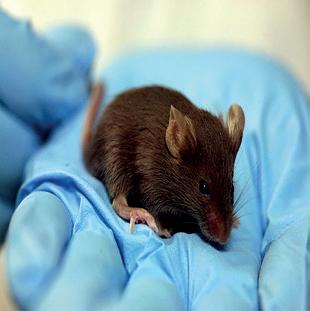

Court sentences former PM to 14 years in university case
THE former Prime Minister of Pakistan, Imran Khan, was sentenced this week to prison for a 14-year term on charges of corruption and bribery relating to a case involving the Al-Qadir University project. Khan, a former world champion cricketer with the Pakistan national cricket team, claims that the charges are falsely created as a tool to prevent him from being in a position of power, having lost a no-confidence vote in 2022.
The Minister for Law and Justice, Azam Nazeer Tarar, stated that “The government will not abolish this university [but] will take custody and run it like any other university.”. However, Khan's lawyers have expressed concern about the private institution falling into the hands of the Sharif family including the Punjab Chief Minister and Shehbaz Sharif, the prime minister. Faisal Chaudhary, for Khan, pledged to appeal the verdict, arguing that the former Prime Minister is innocent, calling the case a "murder of justice."

IN an interview with University World News, Dr Nigel Francis suggested assessment is about “what a student can do, not what they can remember”. With rapidly evolving AI technology, academic staff at universities worldwide are involved in debating how AI is used within student assessments. It has been said that it equips students with knowledge that they can build on and engage with. However, controversy lies within premium tools that some students cannot afford, and presents a white, westernised, male perspective, reflecting the literature it has been fed. In addition, 49 per cent of a webinar audience lacked training required to use AI, crucially reflecting the fears of incorporating gen-AI into student assessment. Whilst it has been protested that AI is not a “shortcut”, many academics and students fear the disadvantages it presents and recognise the challenges of ensuring fairness and the issue of validity of assessment results.
ON the 21st January, Trump signed an executive order targeting Diversity, Equity and Inclusion (DEI) initiatives in federal government, medical industry, aviation and higher education, amongst others. The executive order labels these initiatives as illegal and in violation of “longstanding Federal civil-rights laws”, and argues they undermine “our national unity, as they deny, discredit, and undermine the tradi tional American values of hard work, excellence, and individual achievement in favor of an unlawful, corrosive, and pernicious identitybased spoils system”. The order instructs all federal agencies to investigate and dismantle private sector DEI initiatives, which would include higher education institutions with endowments of over $1bn. This would target mostly elite universities, such as Harvard. The Attorney General also has 120 days to identify all higher education institutions which receive federal funding and take part in the student loan assistance program.
THE national government of Norway and University of Oslo have launched a pilot project using digital wallet technology.

The project proposes a solution to the national shortage of skilled labour, with the aim of helping Norway attract and retain more international students. The project has shown it is possible to eliminate bottlenecks in hiring skilled immigrants and reducing visa processing time from several months to three days. The app reuses verified information from the employer-higher education institute and public Norwegian offices to shorten the wait time for work permits and visas. According to Political Director Anniken Hauglie, before this project the country lacked an overall strategy to combat this shortage. There is currently no termination date for the project, with early users reportedly seeing the potential of the app and applying it.
Gracie Moore Editor-in-Chief
IN a journo request conducted by Exeposé , 91 per cent of students who menstruate at the University of Exeter said that they either have used or would want to make use of the free period products available in the bathrooms on campus. 25 per cent of students also stated that they suffer with one or more reproductive issues that affect the flow and regularity of their periods. Among others, endometriosis (where tissue similar to the uterine lining grows outside the uterus), PCOS (a hormonal condition) and menorrhagia (chronically heavy periods) were listed as conditions that people who menstruate face while at University.
According to the NHS, all of these conditions have the common symptom of heavy and/or irregular periods, with 63 per cent of students who menstruate stating that they experience the former.
At the University of Exeter, steps have been taken towards menstrual activism and inclusivity with the addition of free period products available in the campus bathrooms.
An FOI request has revealed that in the academic year 2023-2024, the University of Exeter spent £30,000 on these period products. Also, up until the 19th December 2024 they had spent £14,000 in the academic year 2024-2025.

In the academic year 20232024, the University of Exeter spent £30,000 on these period products
However, students have spoken out about their thoughts on their effectiveness and whether they are truly inclusive. 50 per cent of students said that the products are not suitable for all flows and that students with a heavy flow may not be able to make as much

to incorporate affordable housing into the scheme at a later date.
PEditor
LANS to build 1,300 homes along Exeter’s waterfront as part of a flagship scheme has been granted approval without any requirement to deliver on affordable or social housing. These plans include not only up to 980 flats and 320 student accommodation units, but also shops and restaurants. The development may be up to nine stories high. The developer has claimed that they have already spent more than £10 million preparing the former industrial site for the development to be built and are keen
use out of the products as others.
One student said: “there is a lack of range when it comes to different flows,” and many said there was “not enough range.” Another added that “most period products available in campus bathrooms seem fairly generic and likely not suitable for everyone.”
When asked about the decision on the types of collection method distributed, the University said that they "can see what products are most popular in what area, and the area manager’s request the products that are needed to replenish from the central stock.” They also said that “The University is in regular contact with the Students’ Guild and are guided by them, however the main preference comes from the users themselves.”
Despite this, some students suggested that the University be in closer contact with menstruating students to gain a better understanding of their menstrual needs.
A number of students also told Exeposé that “there are a few toilets that don’t have them or aren’t well stocked” and that the periods products are “very basic, and my periods are very heavy.”
This student went on to say that they struggle with non-applicator tampons — the product that appears to be available most often.
Aside from the inclusivity regarding flow, a few students raised concerns about the sparsity of period products in the men’s bathrooms. One student said that they’re “not in the men’s bathroom on campus, [I’m a] trans man and have to send female friends in if I need them.”
Plan International UK have declared that nearly two million students in the UK miss part or all of a school or university day due

These plans include not only up to 980 flats and 320 student accommodation units, but also shops and restaurants
At a planning committee meeting on the 27th January, some Exeter City councillors called it unacceptable to approve the plans without any agreement to provide affordable housing. During this four hour meeting, Diana Moore of the Green Party said that this pledge to deliver

to their period — either because of heavy flow, debilitating pain or shame. 32 per cent report to feeling this way at least once a month.
Students at the University of Exeter want better inclusivity regarding the menstrual products available to them, stating that “more needs to be done.”
On the efficacy of the products available to students on campus, the University of Exeter's Students' Guild said:
"We know how important it is to address period poverty and ensure everyone has access to essential menstrual products. That’s why your Students’ Guild has lobbied the University to provide free products across Streatham Campus bathrooms. While progress has been made, there’s still work to do to ensure no spaces are overlooked.
"Your elected Officers Kira and India are continuing to push for better coverage, making sure this vital support reaches everyone who
needs it. “Using student feedback, we've noticed significant gaps in resourcing for period products across campus. We’re working with the University to address these gaps and ensure people who menstruate are properly supported. We’re also collaborating with students to ensure their priorities are at the centre of our work.”
A spokesperson for the University said, "we understand the importance of providing access to essential menstrual products for people who cannot afford them. We have provided free period products across our campuses for a number of years, and we regularly review the scheme with representatives of the Exeter Students' Guild.
"ESG are planning to undertake a student survey on this topic, so we can establish whether we are providing the right type of products in the right locations.”
on affordable housing but at a later date means that "the developer has no responsibility to deliver any affordable or social housing, and that responsibility is offloaded on to the council or housing associations, or other organisations that are going to have to work up those schemes and pay for it in other ways.”
Liberal Democrat leader Michael Mitchell agreed that affordable housing needs to be in contract.
A representative from Water Lane Development Management Company has said that if it is viable to deliver affordable housing they will, but this viability is dependent on changing market conditions.

Amy Rushton Editor-in-Chief
STOKE Hill Roundabout, which sits at the intersection of five roads between a busy student housing area and the primary route to Streatham Campus, has been labelled a “cluster site of collisions” and “unsafe” for cyclists.
The Road Safety Partnership Zero Vision Southwest, a collaborative project which works with Devon and Cornwall Police and Devon County Council amongst others, flags Stoke Roundabout as a cluster site, meaning five or more injuries have been recorded in the last five years within a 50-metre radius. Of the seven reported collisions on Stoke Hill Roundabout between 2019 and 2023, six have involved a collision between a cyclist and a car, raising significant concerns about the safety of cyclist commuters to Streatham Campus.
Whilst collision reports are only released in July the following year, meaning 2024 and 2025 reports have not yet been released, a spokesperson from Exeter Cycling Campaign has told Exeposé the site remains dangerous for cyclists. In January, she came across a student cyclist who had been hit by a driver on the roundabout. He was able to swerve “otherwise the outcome might have been much worse.”
Multiple factors contribute to the danger posed by Stoke Hill specifically: it sits at an intersection of five different roads, sees high volumes of traffic, and has wide lanes which encourages cars to speed. Most crucially, the cycle path on Prince of Wales Road abruptly stops before the roundabout, forcing cyclists back
on a busy road. Whilst signs have been put up stating “Watch out for cyclists”, nothing more has been done to ensure safety.
The danger posed by Stoke Hill Roundabout has been emphasised by student cyclists. In a survey conducted by Exeposé, multiple students highlighted Stoke Hill as an area of high concern, with one stating “[Stoke Hill] is really dangerous, especially cycling at night or rush hour when there’s lots of traffic, cars cut you off and drive dangerously rather than treating you as a fellow road user.”
These concerns are not limited to Stoke Hill, only 57.1 per cent of student respondents labelled Exeter as safe to cycle in overall, highlighting Prince of Wales Road, Sidwell Street and the High Street as other areas of heightened concern. According to Devon County Council, 131 reported collisions in 2023 involved a cyclist, adding to pressure to create safer and more sustainable routes across Devon.
78.6 per cent of students surveyed by Exeposé currently cycle to and from campus, or had in the past. They highlighted numerous safety concerns, chief among them hostile attitudes from motorists. One student stated, “there is a general culture of hostility towards cyclists from motorists which is entirely counterproductive,” and another, “sometimes cars overtake when it’s not safe, especially when going to and from campus.” Students also emphasised issues with infrastructure, emphasising potholes, street lights, and a lack of adherence to cycle paths on campus, which are often crowded with pedestrians.
The Exeter Cycle Campaign has been pushing for improvements to cycle infra-

Audrey Alvey Satire Editor
WHILE conducting improvements to electricity infrastructure in Exeter’s city centre, engineers stumbled upon what archaeologist Simon Hughes called “some interesting finds.” Digging at a depth of around three metres, the National Grid’s project has inadvertently facilitated a rare opportunity for archaeologists to research the early medieval society of Exeter
structure and safety in Exeter. One key facet of this campaign is campaigning for the Exeter Local Cycling and Walking Infrastructure Plan (LCWIP). This pushes for developments to cycle infrastructure, including plans for the E4 cycle route which stretches from St David’s Station to Exeter, covering a key commuter path to Streatham Campus for students and staff.
However, many of the recommendations of the LCWIP have not yet been delivered. Biddy Walton from the campaign stated, “although Devon County Council is a Vision Zero SW signatory, I am not seeing action on the things that matter. I am not hearing them make real contributions to road safety. I am not hearing them listen to the alarm bells that vulnerable road users keep ringing.”
She further recommended students raise this with election candidates, email councillers and lobby the University, stating, “it should feel safe to use a healthy, sustainable means of transport to move around Exeter. It should not require bravery from our children to cycle to school. Our councils should be designing roads and junctions that are safe for people of all ages and abilities to walk and cycle.”
In 2019, the University of Exeter declared a climate emergency with the plan to reach net-zero by 2030. Sustainable travel is critical to achieving this, however according to the University’s Sustainable Transport Strategy 2024 only four per cent of students travel by bike, a drop from 16 per cent of students in 2016. Safety and infrastructure concerns have the potential to limit student cycling in the city. Many students surveyed by Exeposé shared frustrations with the University, with one stating, “[the University] should work with the City Council to provide better infrastructure for cyclists and pedestrians. Stop wasting millions of pounds on the construction of more carparking space such as Streatham Car Park B. It’s shameful. You can’t keep laying tarmac on top of greenfield indefinitely. Deal with the root cause of the issue by making cycling/walking more attractive/ safer,” and another, “invest in better cycling infrastructure, more cycling racks, reduce parking space for cars and prioritise getting more students on bikes.”
When asked how the University were engaging with local authorities on cycling, a spokesperson stated, “the University is committed to encouraging and supporting all of our community to adopt more sus-
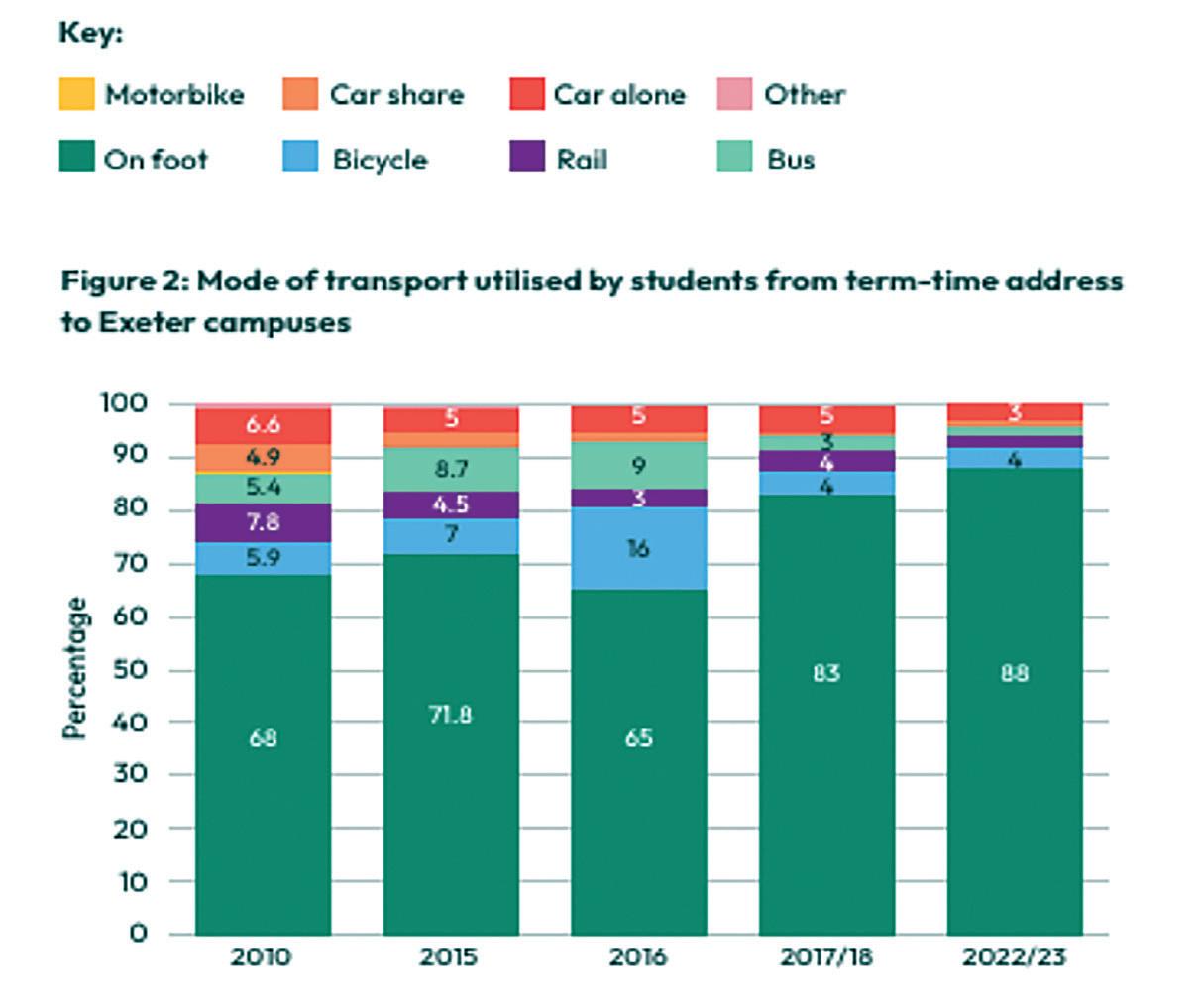
tainable and healthy transport and travel options. We understand that sustainable transport planning is most effective when working in partnership, and our Sustainable Transport Strategy 2024-30 was developed to reflect a number of regional transport strategies, including Devon County Council’s LCWIP. There are a number of schemes on offer to support our community to stay safe while cycling, including Free Safety checks on campus, discounts on servicing and a monthly newsletter which outlines key advice and services.”
A spokesperson for Exeter University Cycling Club stated, “for most of us in the Club we find the cycling around Exeter pretty good but then again most of the time we have a lot of experience dealing with other road users. Stoke Roundabout can be a bit dodgy — it’s not the safest for cyclists at all with bike paths ending and it being a five way roundabout. It’s also completely covered in potholes which doesn’t help. Mostly around Exeter, it’ll be getting better road surfaces for all road users and making sure any bike paths actually connect to each other in a coherent fashion.”
They emphasised infrastructure on campus, adding, “the University could probably do more to advertise cycling as a sustainable way of getting to and from campus. There’s plenty of bike racks dotted around which is great but I personally would prefer more that were under cover […] The Forum bike racks could also do with a clear out — its constantly full and I’m not sure half of the
bikes have been moved in six months.”
This viewpoint was shared by other students, with one student cyclist stating, “cars are given far too much space and precedence. For a university that prides itself on its sustainability agenda, its current commitements are shameful, especially the instant you leave campus. On a bike, you have to take your life in your own hands and deal with hostile road design and motorists who have an unfounded hatred for you despite the fact you are removing another car from the traffic jam they have created.”
When asked if they had plans in the near future to improve cycling infrastructure on campus, the University did not comment.
A spokesperson for the Students’ Guild stated, “we know that cycling is a key way for students to get around Exeter — it’s cheap, sustainable, and often the fastest way to campus. But we also recognise that student safety must come first.
“Your elected Officers are here to listen and take action on the issues that matter to you — from pushing for better infrastructure to lobbying the University or local authority.
“If you’re passionate about making cycling safer and more accessible, why not start a campaign? We’re here to support you with planning, promotion, funding and connecting you with the right people to get your voice heard. If you’ve got an idea, we want to hear from you! Find out more at exeterguild.com/campaigns.”
known then as Isca Dumnoniorum, the regional capital city of its time.
Dislocated human bones of Exonians or rather Iscans were found near where ruined Roman townhouses are believed to have once stood beside the ninth to tenth century minister church, which the extant Cathedral later replaced in 1112. Mr Hughes told reporters that these remains are “currently being analysed to provide a radiocarbon date.” Fragments of Roman pottery found on the same site the basement of the recently closed Waterstones on
Exeter High Street are also being analysed. Archaeologists hope that the results of these studies will develop our understanding of Devon’s situation during the aftermath of Roman Britain’s collapse. Amongst these remnants of pottery is a weight made from fired clay. What myriads of things medicine, food, materials were measured by this artefact are yet to be determined.
The legacy of Isca Dumnoniorum and its transformation into the Exeter we know and love today has a “fascinating narrative.” It is fortunate that alongside
a boost to electrical capacity in our city, we get to simultaneously benefit from such important developments in the understanding of our rich local history.

Isabella van der Putten and Nina Exton News Editors
THIS ARTICLE CONTAINS CONTENT RELATING TO SEX AND SEXUALLY TRANSMITTED INFECTIONS WHICH SOME READERS MAY FIND DISTRESSING
EXETER was named one of the “Chlamydia Capitals” of England in 2023, with 667 cases per 100,000 people, making it one of the worst-affected areas in the country. However, no recent data is available, leaving it unclear whether the situation has improved.
Exeposé conducted a study on university students’ attitudes towards sexual health. The investigation found that 70 per cent of respondents have never been tested for an sexually transmitted infection (STI), even though 40 per cent know someone (or have personally) contracted one. While the university provides a range of sexual health resources, including links to external clinics, free condoms at Devonshire House, and free STI test kits at the Student Health Centre, many students seem unaware of these services.
Image: Section 28 and its Afterlives
Despite the accessibility of STI testing through external providers, students often don’t seek a test unless they experience symptoms or believe they’ve been exposed. One student stated: “I haven’t ever thought to get a test because I’ve never had any issues/suspicions”. This reactive approach is risky, as many STIs,
including chlamydia and gonorrhoea, often present no symptoms at all. In fact, 70 per cent of women and 50 per cent of men with chlamydia are asymptomatic, meaning students could be unknowingly carrying and transmitting infections. The idea that testing is only necessary when something “seems wrong' suggests that many view STI tests as a response rather than part of routine sexual healthcare.
Beyond misconceptions about when to get tested, lack of awareness about available services also plays a role. While 40 per cent of students do not know where to get an STI test in Exeter, those who do know generally report no issue accessing sexual healthcare. Only 5 per cent of respondents reported difficulty accessing STI testing, yet 50 per cent said the university does not do enough to promote sexual health awareness, and 60 per cent believe Exeter needs more accessible sexual health services. One student stated: “I don’t think they really do anything. They provide free protection, which is great, but it feels like the elephant in the room. Almost like ‘here are the condoms, take them if you need them, but that’s all we’re going to say’”. Another claimed that they “don’t see much about it from the university” and that “they probably could do more”.
The university provides free STI testing kits at the Student Health Centre and free access to condoms in Devonshire House, yet only 25 per cent of resppondents have used these resources. The majority (75
per cent) have never accessed free condoms, with some admitting they didn’t know they were available. Students claimed, “to be honest, I didn’t know it existed,” and that they “wouldn’t know where to go for this”. This raises questions about whether promotion efforts fail to engage the student body.
While condoms are effective in preventing both pregnancy and STIs, some students report viewing them primarily as a means of birth control rather than infection prevention. One student stated: “I think protection is important to students, but I think this has more to do with pregnancy prevention than STIs”. With increased reliance on hormonal contraception such as the pill, IUDs, and emergency contraception, condom use has become less consistent, particularly in long-term relationships, where partners often assume they are STI-free without testing.
Some students admitted they trust that their partners are clean or expect their partners to provide protection rather than taking control themselves. One student admitted: “for me, I depend on my partners being clean or bringing condoms”. This is particularly concerning in casual encounters, where assumptions about sexual health status increase the risk of STI transmission. While the statistic is low, a concerning 17.5 per cent of students said they would not feel comfortable telling a partner if they tested positive for an STI.
Although 75 per cent of respondents believe Exeter has
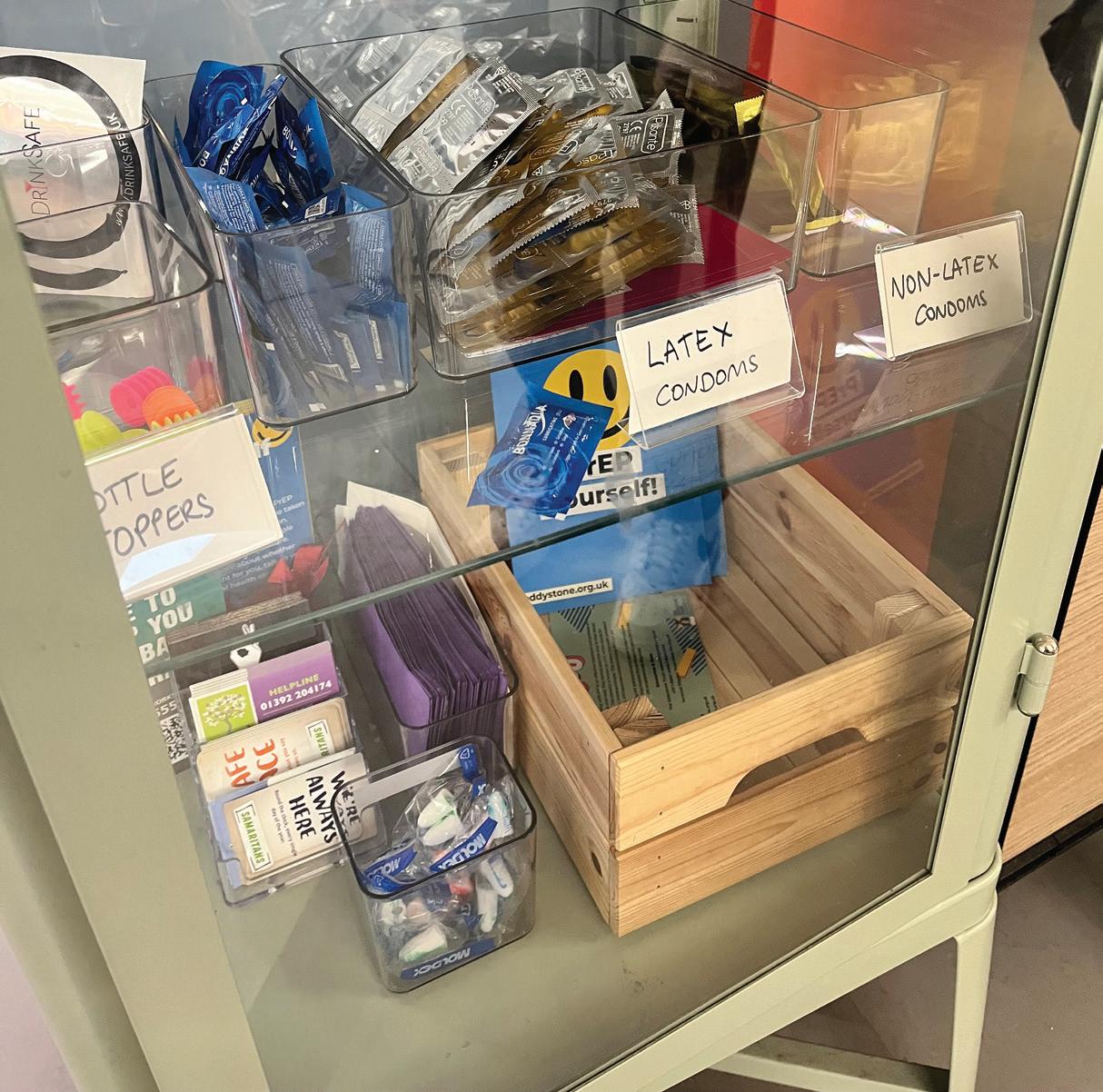
a strong hookup culture, only 25 per cent think casual sex is the dominant dynamic. Instead, 65 per cent describe the dating scene as a mix of hookups and relationships. One student stated: “compared to my friends at other universities, Exeter, at least in my opinion, is fairly tame”. However, there is a clear divide in attitudes toward casual sex and relationships. One student stated: “hookups can be perceived as dirty or shameful, whereas relationships are more respectable”. This stigma could be a key factor in discouraging some students from getting tested, with 15
per cent admitting they had avoided STI testing due to fear of judgment. 60 per cent of students believe there is still a stigma around getting tested. Despite greater openness around sex and relationships, STIs still carry an element of shame, particularly within certain social groups where discussing sexual health remains taboo. Sexual health should be as much a priority as any other aspect of student well-being, yet Exeter’s high STI rates, low testing figures, and lack of engagement with university provided services suggest that it remains an afterthought for many.
Charlie Gershinson Deputy Editor
THE University of Exeter has recently launched ‘MyExeter’, a new app for students and staff, as a replacement for ‘iExeter’. MyExeter has said to have been built to help “improve the student experience at Exeter” with “insight and feedback” from students. It is designed to reduce the number of places students need to access information about their studies and so make MyExeter the “one essential tool” for life at the University. Since its launch in September 2024, MyExeter has over 23,000 downloads and 15,000 active users over a 30-day period. Features of the app include the ability to check your timetable, find
study spaces, discover events taking place on campus and access outside sites such as ELE, the Student Record System and the student email.
The previous iExeter app is still operable and may be needed to register attendance in classes but the University’s current priority is to develop the functionality of MyExeter. MyExeter will be updated and improved regularly based on feedback and student experiences with the upcoming update constituting the seventh release since its launch.
When asked for comment, a spokesperson for the University said, “since its launch we have focused on enhancements to navigation, improving accessibility, refining the look and feel of Timetable, and improving the structure and content of ‘more menu’ items. The
University of Exeter’s digital strategy set out the ambition to invest long-term in developing a digital experience that isn’t limited by third-party contracts. This will enable ongoing improvements, more control and flexibility, and the opportunity to develop digital products that can grow with the University and support strategic goals. iExeter is an app that has been in place for several years and was developed and maintained by a third party provider, so by developing MyExeter in-house, we are able to have full ownership of our digital product, technical processes, technology choices and the development journey.
“Our Digital team has direct access to colleagues and students, enabling us to understand their unique challenges and needs. Taking a user centred design approach, we work
directly with our students to ensure it meets their needs. Student feedback has shaped MyExeter every step of the
way, and we continue to gather user insight to inform future development.”

Rosie Peters-McDonald Deputy Editor
ASOUTH Devon artist, Kate Tyler, recently displayed her art in three exhibitions across Ashburton as part of a communitywide project made using a vintage photobooth. The exhibited artwork was composed of over 550 strips and measures at 98 feet long. Funded by the Teignbridge District Council and the UK Shared Prosperity Fund, Tyler’s work was on display at the Field System Gallery, Ashburton Arts Centre, and St Andrew’s Church.

The exhibited artwork was composed of over 550 strips and measures at 98 feet long
On her website, Tyler details the philosophy behind her chosen medium, “in other countries the booth is more of a ‘just for fun’ installation a way for couples and friends to record a moment and gain an instant photo for posterity. In the UK, we’re told not to smile, to enter the booth on our own, and under no circumstances to ever look like we are enjoy-
ing ourselves. Yet each participant’s personality still shines through in these photos, despite the mask being subversive, and the images are both menacing and playful simultaneously.” In the past, Tyler has been featured in the National Portrait Gallery and in Raynal Pellicer’s book, Photobooth: The Art of the Automatic Portrait Tyler opened up to Exeposé about the story behind her exhibition, “I was delighted with how enthusiastically the community around Ashburton became involved in the project. From older residents reminiscing about the last time they used an analogue photobooth to younger residents experiencing the joy of chemical photography development for the first time, hundreds of people embraced the project and worked with me to create an extensive and comprehensive legacy to the people of the town. Interested in the ways in which photobooths have traditionally been used for ID purposes, I wanted to use the booth here to create a more playful identity of the different individuals and, collectively, of the town itself. The result is an incredible testament to the Ashburton community, featuring 538 photo strips, 452 people and 19 dogs!”

Agata Koralewska Deputy Editor
ALITTLE-KNOWN fact is that Exeter has its own brand of beer, beloved by many students and also appreciated by a wider demographic, after it gained popularity across the nation. JUBEL has won the best craft beer award at World Beverage Innovation Awards in 2019, as well as the Drinks Brand of the Year at the 2022 Grocer Gold Awards. It is now recognised nationally as it as it was announced bestseller for a leading UK retailer this year.
The sweet-tasting, fruity pint named JUBEL is a fruit lager that was created by a student who attended our University. Jesse Wilson, Exeter Business School alumnus, took inspiration from the refreshing, French bière-pêche that he drank during his trip to the French Alps, and decided to start his own beer brand in the UK in 2018. Its name originates from a title of a song that was played when he was drinking the aforementioned bière-pêche, and the word means “a feeling of extreme joy,” reflecting how the main idea behind JUBEL is to be enjoyed both by beer lovers and beer haters, because of its ap-
pealing flavour. Its founder explains that JUBEL aims to become a new category beverage that “cuts through the middle of beer and cider.”

JUBEL aims to become a new category beverage
At first, the project was supported with a grant from Exeter’s Student Startups programme, which allowed three student interns to join, and quickly the brand expanded into 300 pubs and got a listing with Sainsbury’s. Since then, JUBEL started to have a growing presence in pubs and bars in Exeter and across the country. Becoming the leading retailer’s best-seller is just one more achievement on the long list of JUBEL’s successes. Jesse Wilson stated, “we started by selling our beer in just one shop, and I remember being stood there handing out samples to get people to try it. Now to be the number one selling craft beer in a major retailer is hugely exciting.”
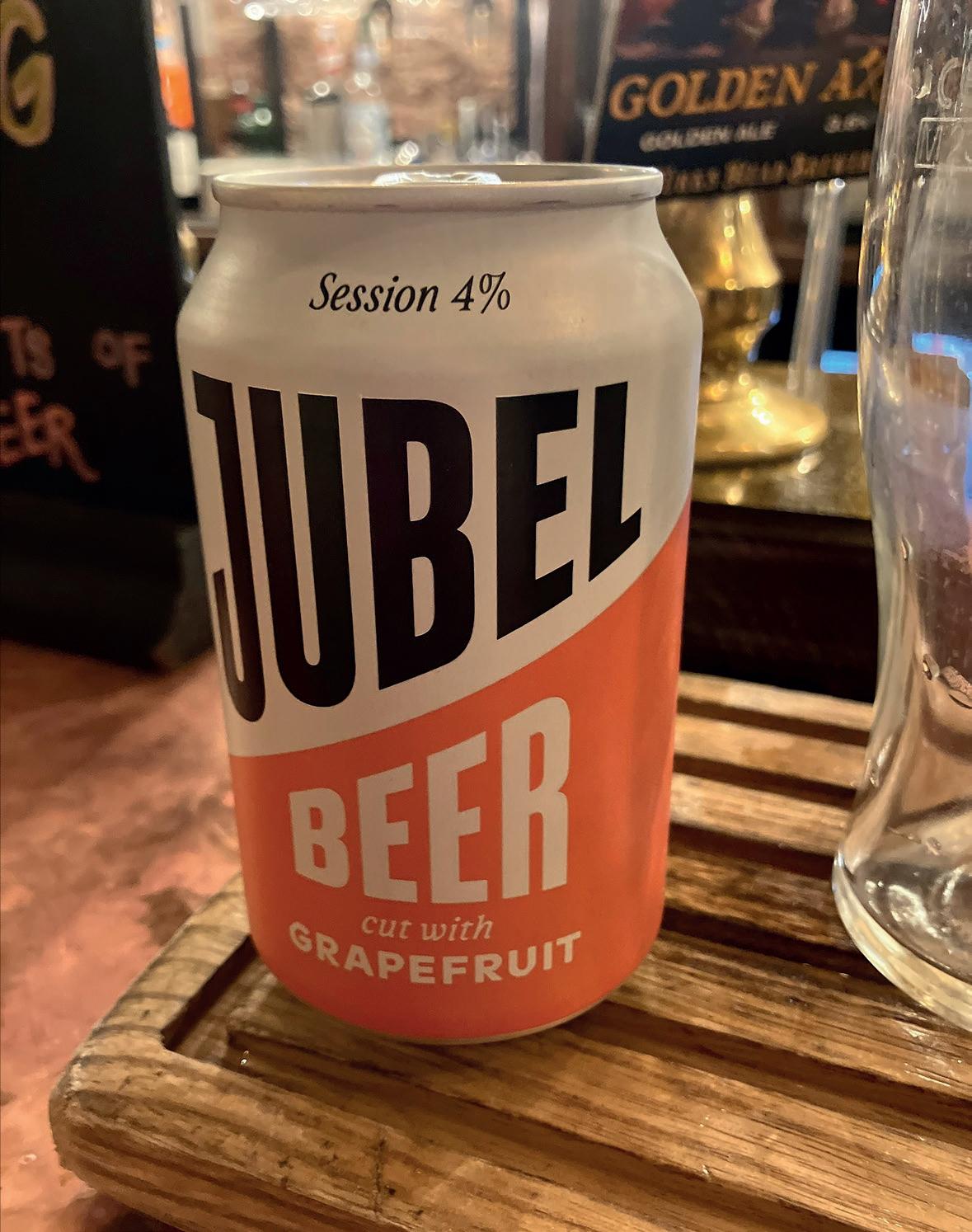
THE Student Publication Association (SPA)’s 2025 Regional Awards were announced for the Southwest at the end of January. We are proud to announce that Exeposé is (once again) the South West’s Best Publication. The judges said of Exeposé, “this publication excelled across its mediums, with the addition of new columns, sections, and even expanding into podcasting. Students at this publication are finding new and dynamic ways to tell stories and serve their student community.”
Exeposé also won Best Design (Print), with the judges stating, “this publication’s print output represents its understanding of its readership. It has striking design, a page dedicated to printing in different languages, and a range of hard news stories. Crucially, it also knows how to have fun, with an outstanding Freshers Week edition.”
Our writers took home three individual awards: Best Article for Poppy Jabelman with ‘Just Stop Oil forum protests, one year on: reflections from George in prison’; Highly Commended Article for Charlie Gershinson with ‘Shambolic: Exeter students deliver verdict on EGB fiasco’, and Best Journalist for Gracie Moore.
This is thanks to an incredible team of writers and editors — Exeposé is truly a team effort, and these awards represent the tireless work they put in to produce quality content every week. If you have so much as proof-read one article for us, this is your win too and you should be very proud.

We may be dating but I still have a crush on my girlfriend — the kindest, hottest, most wonderful person I've ever met — I love being a lesbian. <3 — Anon
My ex boyfriend. :( — Anon

The cute International Editor on Exeposé committee with the pink hair! I know it's your birthday soon so let me take you out for dinner! — Anon
Big biceps from Essex — Anon
Girl in first year psychology, round glasses, brown hair and a brownish messenger bag. Seems very clever and is very pretty, name begins with E.
— Anon
Tall and sporty girl who was on TikTok winning a starbucks voucher? Often see her on the squash/ tennis courts, I think her initial is S.
R.M. The most beautiful girl in the world. She studies English and is a truly special mind and soul. — Anon
The lil' ginger guy who's always asleep in Study Zone. — Anon
The history grad who is always in Hiles Group study room. Short stature, great moustache. X — Anon
Spotted today wearing a blue and white stripey shirt, wasian brunette with straight hair down to her mid back.
— Anon
I fancy mysef. — Anon
A first year in biochem, brown hair and a nice smile. His Irish accent alone could make me say yes to anything.
FEATURES EDITOR:
Honor Borley
Bella MacLusky
HOLOCAUST Memorial Day (HMD) serves as a vital platform for education, remembrance, and dialogue, aimed at preventing future atrocities and shedding light on the horrors of genocide. Initially introduced in the UK in 2001, HMD is now observed globally, with numerous nations hosting commemorative events that focus on education and activism.
A core aspect of HMD events is their educational focus, which often includes survivor testimonies, curated exhibits, and workshops. Survivor testimonies offer deeply personal narratives, illustrating how “ordinary” individuals either became complicit in the atrocities or resisted by acting as rescuers, defying the systemic dehumanisation surrounding them. These moving accounts underscore individual agency, encouraging audiences to reflect on how they might respond in the face of prejudice and hate. By centring on the personal, human dimensions of the Holocaust, HMD fosters nuanced reflections on human behaviour, highlighting humanity’s potential for both cruelty and courage.

HMD fosters nuanced reflections ... highlighting humanities potential for both cruelty and courage
HMD’s significance in modern society is profound, particularly because it connects historical events to contemporary issues. The UK’s
N2023 commemoration, for instance, successfully addressed modern challenges such as the refugee crisis and the rise in hate crimes, drawing parallels to the lessons of the Holocaust in tackling xenophobia and intolerance today. By doing so, HMD transforms Holocaust memory into a practical tool for confronting present-day injustices. However, it is crucial that HMD avoids being co-opted by political agendas, which can dilute its educational value. Historian Donald Bloxham warns of the dangers of exploiting
Holocaust memory for contemporary political purposes, as it risks oversimplification and diminishes the event’s profound significance.

Historian Donald Bloxham warns of the dangers of exploiting Holocaust memory
A student aptly remarked, “people forget the impact of the Holocaust on the Jewish com -

munity today.” This sentiment underscores the need to preserve the specific moral and historical context of Holocaust memory, avoiding its reduction to generalised human rights lessons.
The urgency of HMD is further underscored by the rise of far-right extremist movements across Europe, including Reform UK in the United Kingdom, National Rally in France — whose leader was seen with a copy of Mein Kampf — and the Alternative für Deutschland (AfD) in Germany, which has a vocal base of white nationalists. Such groups pose a direct challenge to the principles of tolerance and remembrance that HMD seeks to uphold. Compounding the problem, figures like Elon Musk have publicly praised groups like the AfD, calling them the “best hope for the future.”

Elon Musk has publicly praised the AFD calling them ‘the best hope for the future’
These narratives are not only damaging to Holocaust memory but also risk normalising extremist ideologies. In the face of such rhetoric, HMD is more than valuable — it is indispensable. By preserving the memory of the Holocaust and fostering collective reflection, HMD equips society with the tools to counter hate, challenge extremism, and ensure that history’s darkest chapters are neither forgotten nor repeated.
Is necessity really the mother of innovation?
ECESSITY is the mother of innovation. This age-old proverb dates back to Ancient Greece, with Plato’s Republic . The Greek philosopher mused on the human need for arts and poetry, deeming them useless. He also commented on innovation and greed, saying “money-makers are tiresome company, as they have no standard but cash value.” Instead, he believed we should create from necessity, as opposed to desire or for personal gain. Throughout human history, innovation has always largely been for our own survival, or to increase efficiency. Medical innovations, such as the discovery of penicillin, antibiotics, and vaccinations, have saved millions of lives. Transport technology — planes, boats, trains and cars — have allowed humans to explore the world, complete work more efficiently, and respond quicker to disasters. One would assert that many innovations surrounding music and the arts were also a necessity for human growth. As our species continues to develop, so does our need for knowledge and understanding. Through the arts, we are able to experience and understand new cultures and traditions, and see new perspectives. Technological innovations have allowed for this; accessibility of the arts is more widespread than ever, spreading to almost every corner of the globe, breaking down
social barriers and long-standing prejudices.

Accessibility of the arts is more widespread than ever... breaking down social barriers
However, within the past 50 years, humans have found new driving factors behind innovation. While much innovation is still aimed at helping others, the intertwining of political alliances, greed, and technological inventions have become far too present. One prime example of this phenomenon is Elon Musk, American tech CEO and billionaire. Just this year, Musk has been appointed to helm the US Department of Government Efficiency, as a result of his ties with Donald Trump. His innovations, Tesla and SpaceX, which allowed him to fulfil his desire to rise to political power, are extremely environmentally damaging. In April 2023, Musk released a SpaceX rocket, which exploded on the launchpad, “jettisoning flaming heavy debris into sensitive wetlands.” This event, and other similar instances by the company, have resulted in wildfires, habitat destruction, and contamination of water supplies. Musk has not commented on these effects, instead carelessly stating “we’ve got a lot of land with nobody around, and so if it blows up, it’s cool.”
On the other hand, there is hope for human ingenuity. Last year, one breakthrough innovation was Filter Caps, produced by Baylor International Filsa Water, the Colombian Red Cross, and Ogilvy Colombia, to make drinkable water much more accessible. “Every day in Colombia, the news is about child malnutrition in isolated or forgotten communities like La Guajira and El Choco,” says Fabio Quiroga, Ogilvy Colombia’s CEO. The caps use 3D-printing to craft layers of corn resin, which shapes a fixture that attaches to the top of a bottle. Users can fill from a well, pond, or a river, and any contaminants and impurities are filtered out. The company estimates that they’ve provided as many as 10,000 people with clean drinking water as a result of necessity.

10,000 people have been provided with drinking water, as a result of necessity
The proverb “necessity is the mother of innovation,” could still be regarded as relevant today, but for some individuals, it seems to have been forgotten. Political allegiances and greed have complicated the world of ingenuity, resulting in environmental negligence. Innovation can stem from necessity, compassion, or love.

THE Democratic Republic of the Congo (DRC) has seen another wave of conflict this week with thousands of people fleeing Goma, the main city, as the militant group M23 reports taking control of the city. They are expected to target Bukavu next where the Congolese army has established a defence. Congolese president Félix Tshisekedi has vowed to restore government authority referring to members of the M23 as terrorists, and criticising the international community for “inaction”. Since the fighting began, the city has been cut off from electricity and water. With 400,000 civilians being displaced and local hospitals overwhelmed, the UN warns of a dire humanitarian crisis arising in the DRC.

With 400,000 civilians displaced and local hospitals overwhelmed; UN warns of a dire humanitarian crisis arising in DRC
The origin of this fighting stems from the genocide in Rwanda in 1994. Hutu extremists slaughtered over 800,000 people, the vast majority being from the Tutsi community. The genocide only ended with the successful victory of Tutsi-led rebels commanded by Kagame, who became president of Rwanda soon after this. Around one million of these Hutus fled across the border into the DRC to avoid punishment. This has created extreme tensions between the Hutu and the Tutsi.
After years of conflict, a Hutu group, the Democratic Forces for the Liberation of Rwanda (FDLR) is still active in the DRC. Rwanda says its continued existence in the DRC threatens its own territory. The Rwandan army has invaded the DRC twice, claiming it was going after some of those responsible for the genocide.

The Rwandan army has invaded the DRC twice , claiming it was going after some of those responsible for the genocide
The M23 group are led by Tutsis, who say they needed to fight in order to protect the rights of the minority group. Shortly after its creation in 2012, the M23 gained significant territory. However, there was international outcry with accusations of war crimes. It withdrew and M23 fighters agreed to be integrated into the army in return for protection of Tutsi communities. Although in 2021, the group took up arms saying the deal hadn’t been respected. Rwanda has consistently denied that it supported the M23, but since 2012, UN experts have accused it of providing weapons and logistical support. Last year, the UN said that around 4,000 Rwandan

Itroops were fighting alongside the M23 and there are reports of Rwandan troops fighting this week. The DRC have accused Rwanda of using the conflict as a way of looting minerals such as gold, noting a huge rise in Rwanda’s mineral exports in recent years. This is expected to have come from the DRC. The UK and Germany are amongst countries that have threatened to withdraw their aid to Rwanda due to this recent activity.

The UK and Germany are amongst countries that have threatened to withdraw their aid to Rwanda due to this recent activity
An East African regional summit urged DRC to directly engage with all stakeholders including M23 but Tshisekedi refused, insisting on only talking to Rwanda. The Southern African Development Community, and the UN peacekeeping mission have both been unable to control the rebels, with Tshisekedi deeming it a failure. Many worry that the M23 will not withdraw from the DRC until they are satisfied that the Hutu have been punished, this could result in substantial violence and loss of life.

Many worry the M23 will not withdraw from DR Congo until... the Hutu have been punished
Astrid Welch discusses the tense relationship between Starmer and Trump this festive season
N their first call since President Trump took office, the conversation between the US President and UK Prime Minister signalled a promising start to their diplomatic relationship. Sources described the call as ‘warm’ and ‘personal’, maintaining a central focus on building rapport despite their ideological differences. However, some policy discussion also took place, with a Downing Street spokesperson noting that the leaders discussed how their countries could establish a “fair bilateral economic relationship.”
However, maintaining a strong relationship may be challenging, as history shows the UKUS partnership is highly dependent on context and can deteriorate quickly. The UK and the US have long been described as having a ‘special relationship’, marked by co-operation in certain areas, notably intelligence sharing and security. However, the strength of this partnership fluctuates depending on geopolitical events and the leaders’ personal dynamics. In the late 1990s and early 2000s, Tony Blair and George W. Bush maintained a strong alliance, particularly with the events of 9/11 leading to alignment on security and foreign policy. While Barack Obama and David Cameron had a good personal rapport, their differing views on international affairs caused diplomatic tensions. Theresa May’s relationship with Donald Trump was notably strained, as she admitted, “with…Trump, I never know what to expect.” In contrast, Trump and Boris Johnson shared a strong rapport due to their similar political styles though Johnson quickly distanced himself after Trump’s 2020
election loss. There appears to be no consistent pattern; instead, the UK-US relationship is dependent on a range of political and personal factors. But what does this mean for the current leaders? In short, the UK and US have always worked closely together, but the strength of the ‘special relationship’ depends on the context.

The strength of the ‘special relationship’ depends on the context
As for the relationship between Starmer and Trump, early signs suggest personal rapport, but their stark political differences could create tension and test their relationship in 2025. Firstly, Labour’s open support for the Democratic Party in the 2024 presidential race may strain ties. Senior Labour MPs David Lammy and Wes Streeting issued strong, personal criticisms of Trump; while not directly from Starmer, these remarks are unlikely to be forgotten by the President.

Early signs suggest strong personal rapport but stark political differences could create tension
Secondly, Elon Musk’s role in Trump’s cabinet adds complexity to the UK-US relationship.
If Musk’s controversial claims about free speech and child exploitation under Starmer’s leader-
ship gain traction with Trump, this could lead to strain between the UK and US. Finally, defence spending is a point of contention; Trump has voiced frustration over the US carrying a disproportionate share of NATO’s military costs, and Starmer’s government will likely face pressure to increase the UK’s defence contributions in the coming months. These factors suggest that while the UK-US ‘special relationship’ will endure, navigating it may be more challenging than these initial calls may suggest. Starmer will need to strike a careful balance, fostering a strong working relationship with Trump while avoiding the longstanding risk of prioritising US interests at the expense of the UK’s diplomatic independence.

IN 2019, the UK became the first major global economy to pass laws to end its contribution to global warming through reaching net zero by 2050, aiming to reach this target through a four-point strategy.
The UK government believe that the rise of AI in recent decades plays a crucial role in helping to meet their net zero target. The ‘AI for Net Zero’ initiative, led by experts from the University of Exeter received £2 million in research funding in order to drive the UK’s commitment to reaching net zero by 2050. This new project builds on the work of an existing project, NetZeroPlus led by researchers from the University of Exeter’s Faculty of Environment, Science and Economy.
AI for Net Zero organised their first conference from the 16th to the 19th December 2024, held at the University of Exeter, an event widely regarded as a great success!
The four-day conference programme

featured a diverse range of activities, falling under three key categories: thematic sessions, address sessions and community sessions.
The thematic sessions covered the use of AI in five different sectors: agriculture, environment, energy, infrastructure and innovation and throughout the conference this was discussed in great detail by a series of research experts and university professors. The address sessions split across the three days included talks from invited speakers: professor Veronica Bowman, Professor Amy Binner, Dr Simon Gardner and Saasha Nair all with various findings, for example regarding how AI will assist with the reduction of emissions
and the monitoring of environmental impacts. Finally, the community sessions aimed to bring all delegates together through engaging participatory events, activities and demonstrations. Some of the activities include discussion panels, poster and pizza sessions and a conference dinner.
CLIMATE EDITOR: Charlie
Olivia Ball discusses what happened at a recent climate conference hosted by the University
Gershinson

Conferences like this are crucial for raising awareness about climate change and fostering innovative strategies to help the UK achieve net zero by 2050. AI offers significant potential to sup port government efforts, however, concerns over the reduction of jobs due to the rise of AI have led to growing scepticism about the role AI plays in the UK’s net zero strategy. Despite these challenges, the UK’s well-structured four-point strategy, combined with continuous advancements in AI can facilitate progress towards net zero. Having said that, the potential influence of Trump’s presidency on global climate policies should not be overlooked.
Anderson,
OCATED just 7.5 miles from Exeter City Centre is Killerton, an estate whose grounds have been found to be some of the most significant in the UK for their insects and trees. Encompassing 2,590 hectares of the Devon countryside, the estate is somewhat of a wildlife haven. Recent work by leading UK entomologist (a scientist who studies insects) Dr Keith Alexander has discovered 140 species of wood-decay (Saproxylic) invertebrates, including 72 species of saproxylic beetles and 68 species of two-winged flies. On his work, Dr Alexander said, “this is a remarkable total and firmly places Killerton as the most important site in the South
West for its saproxylic population.”
The park is also famous for its tree population, numbering 1500 veteran and ancient trees, with 200 classified as ancient. They provide habitats for a wide range of diverse insects and ani-
mals, such as bats, mice, toads, birds and lichens. Some of the trees, according to Mat, who has worked on them for over 20 years, date all the way back to the 16th century. They are a product of the wood-pasture management
system from the 16th century as well as the first ‘plant hunters’ of the 18th century, explorers who brought back new plant species from around the world to plant in European gardens.
As such, Mat says there is a real mix,

with oak, beech, horse chestnut, sweet chestnut and lots of veteran apple trees. Due to these new found discoveries, Killerton’s Index of Ecological Continuity (IEC) has risen to 43, placing it higher than other nearby areas such as Whiddon Deer Park (39) and indicating its national significance.
Part of the success of Killerton is down to the efforts of the National Trust, who have delivered nine projects across the estate, thanks to the Green Recovery Challenge Fund. These projects aimed to create new habitats and combat the effects of climate change, helping to prevent floods and storing carbon and water.
Image: Rayhan9d, Wikimedia Commons
Rosie Peters-McDonald, Deputy Editor, explores the recent contributions of Exeter academics in Davos
HE University of Exeter’s own Professor Gail Whiteman and her team of nature and climate specialists visited Davos in January for the World Economic Forum, in the hopes of continuing to drive climate action through university research. Professor Tim Lenton, a member of the Global Systems Institute here in Exeter, spoke on renewable energy and sustainable architecture. According to the University, he, alongside the rest of the team, aims to “drive decarbonisation by creating critical thresholds where small changes lead to significant, beneficial shifts in Earth systems.” The Business School’s Professor Gail Whiteman heads the new
team, which aims to continue the University’s plight to research climate solutions as the Paris Agreement continues to approach its deadline. The Nature and Climate Impact team, which owes its existence to a donation from 2022 honorary graduates André and Rosalie Hoffman, took part in several events and activities as part of the World Economic Forum annual meeting, including a musical performance coined ‘Performing Hope,’ which the University has claimed “aims to encourage and empower everyone to take action, fight climate anxiety and loss of hope.”
At the meeting, Professor Whiteman shared her thoughts on the climate battle ahead, telling journalist Nik Gowing
that “there’s no question that we’re losing the battle, not just in terms of CO2 emissions, which continue to climb, but we’re also losing the battle in terms of narrative, language, and hearts and minds. As a social scientist who has spent their entire career trying to translate natural science into narratives that business and consumers and citizens understand, we just need to actually do a hell of a lot more. We need to rapidly learn and partner with each other.”
Peter Bakker, CEO of the World Business Council for Sustainable Development, praised the Nature and Climate Impact Team as a “pretty clever idea.”
A number of academics and business leaders spoke on the urgent need for
climate solutions at the meeting, including Dr James Grecian, Polar Scientist in Residence for Arctic Basecamp, and the Managing Director of Global
and Social Issues at M&C Saatchi, Katie Gilbert. The event was certainly a significant debut on the global stage for the Nature and Climate Impact Team.
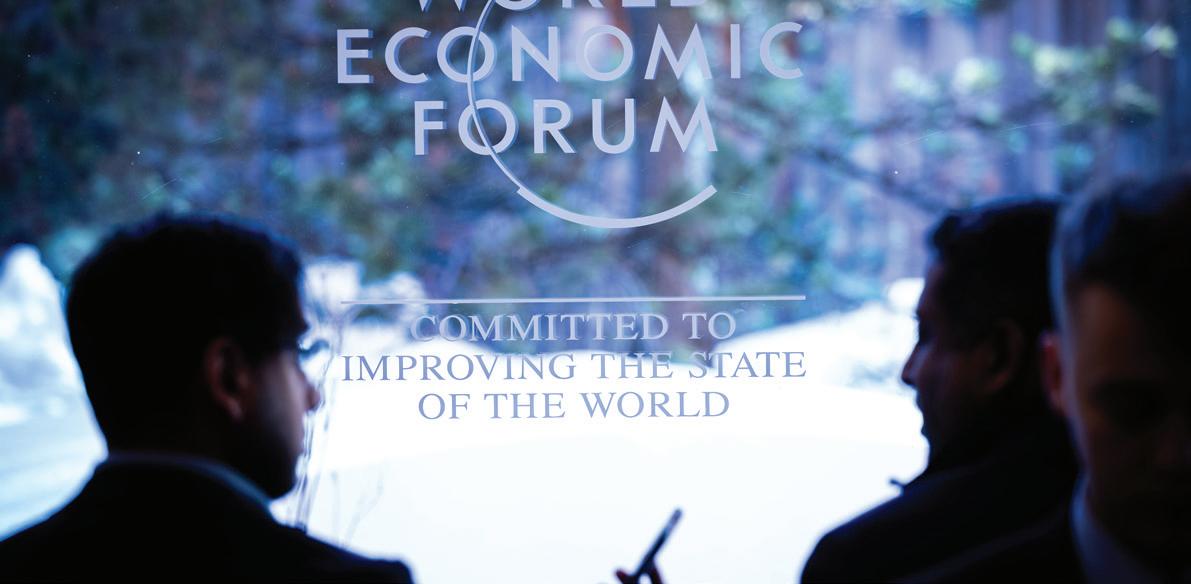
The boy who reads his book on the bike in the gym.
— Anon
Brighton boy in third year philosophy, yaps a lot and I've seen him draw in lectures.
— Anon
L.H., the sexy #shortking tennis coach. I hope my love doesn't mean nothing to you! x
— The cute blonde girl xoxo

There's this leng girl who does engineering (brunette and hazel eyes), pretty sure she just broke up with her boyfriend so I am gonna shoot my shot #Iloveyou #Immuchbetterthanhim.
— Anon
The beautiful Cupid-In-Chief herself. — Anon
My girlfriend Elodie. :) — Anon
E.F. He does engineering and I always stare at him during lectures. He's super hot, some would say fire. — Your secret admirer.
The redheaded girl with curly hair in my Chaucer seminar. <3 — Anon
Crazy Polish girl, I think she's in Exeposé? — Anon
A fruity shooting my shot to see if this hockey lad — tall and fit, never misses a TP Wednesday with his fellows, great smile and has initials R.C — plays for the same team as mine?
— Anon
Tall blonde guy named Matthew in my Politics and Reform in the Gulf lecture, my dad would love you.
— Anon
This guy from the gym I see every morning. Dark brown hair and brown eyes, muscular build. Found out he is in the football team with initials J.S. Bit of a dark horse, very mysterious and alluring.
— Anon
Tom Richardson, Comment Editor, examines recent attempts by Truss to stay in the limelight
LIZ Truss continues to attempt to remain politically relevant in a cringeworthy fashion. One can only come to the conclusion this is some form of ritual self-humiliation in atonement for her ‘sins’ in government.
Last month, Truss had gone to Washington DC in support of Trump, though unfortunately for her, she failed to get an invitation to the inauguration I’m sure it just got lost in the post, Liz! Even Kwasi Kwarteng, Truss’s former economic ‘partner-in-crime’ labelled it a ‘pathetic’ attempt at relevancy, with her declaration that we need a ‘British Trump’ in the UK. This begs the question, with her antiLGBT and ‘DEI hire’ rhetoric, what bandwagon will she not jump on?

Unfortunately for her, she failed to get an invitiation to the inauguration
This obviously is not her only embarrassing thing after her premiership. In her book, Ten Years to Save the West , published last year, she seems to take the nickname
WE’VE just made it through the first month of the year, where many people decide to adopt new habits or commit to challenges to start their new year in a healthier way: one of the most popular of these being ‘Dry January’ giving up alcohol for the month. However, more and more people, particularly young people, are opting to reduce their alcohol intake or cut it out for good.

According to the Drinkaware website, in England, the highest prevalence of non-drinking was amongst adults aged 16-24 with 26 per cent (2022). Whilst being
‘The Human Hand Grenade’ as a compliment and blames everyone apart from herself for any failings during her short tenure as Prime Minister. In publicising it, she appeared with Steve Bannon on ‘Real America’s Voice’, engaging in stereotypical ‘deep state’ rhetoric, refusing to push back on his reference to Tommy Robinson as a ‘hero’. Now that is is a disgrace!
As a former Prime Minister, she has given legitimacy to rhetoric which we have long attempted to avoid in bringing to the frontline of British politics.
This has not only caused embarrassment to the nation, but also the Conservative Party. Truss refuses to leave the limelight, and therefore the Tories needs the courage to completely reject her.

The Tories need the courage to completely reject her
With Truss leaving office polling as low as 6 percent, if Badenoch wishes to see the Conservatives reach electoral success or regain trust amongst
the public on the economy once again, then she must tackle electoral liabilities in a similar fashion to how Starmer did successfully with the radical and unelectable elements of the Labour Party.

Badenoch must tackle electoral liabilities in a similar fashion to how Starmer did
Some senior Tories have suggested she takes a year from the public gaze, why not make it forever?
There’s only one thing more embarrassing than Liz Truss and that’s being compared to her! Poor Rachel Reeves (or rather poor us after her god-awful budget!) has been denounced by a Labour MP after claiming in jest that she had “Liz Truss as her ghostwriter” for the Budget. Despite the international embarassment Liz Truss continues to cause, I must respect her determination to become a serious political figure after being outlived by a head of lettuce.

sober or sober-curious, especially at university where drinking is so ingrained into social culture, can be a somewhat daunting idea, there are many benefits that embracing sobriety can bring. Reducing alcohol intake or completely cutting it out has
many benefits for our health physical and mental. Speaking from experience, I found that when I stopped drinking, I was much more able to focus on the present rather than ruminating on the past. I would constantly take it too far on a night out, and in the morning, I would

wake up with not only a hangover, but a bad case of hangxiety, trying to piece together what exactly occurred the night before. Of course, everyone’s experiences with alcohol are different, but it is in itself a depressant. Whilst alcohol can initially give feelings of confidence and relaxation, it disrupts the chemicals in the brain, potentially leading to lowered inhibitions, disrupted sleep, anxiety, depression and anger. By having alcohol-free days, it maintains the chemical balance and also prevents a reliance on alcohol to feel

is also linked to many diseases, such as several types of cancer
confident. Alcohol is also linked to many diseases, such as several
types of cancer and dementia, perhaps another factor as to why more young people are deciding to reduce alcohol consumption. Cutting down is not just greatly beneficial to your physical health, but also your financial health. This is something that is definitely a bonus as students navigating the rising cost-of-living. Even if you don’t want to completely stop drinking, having an occasional sober night out will lessen the burden on the bank account (and prevent any unnecessary drunken purchases of shots for example...) A sober night out might not evoke feelings of enthusiasm, but you will wake up a lot more refreshed in the morning and you will still have fun with your friends! Perhaps if you are worried about doing it alone, you could ask a friend to go sober with you.
Comment writers debate the necessity of Britain increasing their military capabilities
FOLLOWING the current line of worldwide events, it seems that the UK must raise its defence spending to be prepared for international conflict, as tensions are growing exponentially.
Since the inauguration of Donald Trump, multiple events have taken place to suggest that international conflict is not far from our reality, making an increase in military capabilities a necessary matter of selfdefence. Trump will be clearly investing in the military, with his threats of war with Denmark, conflicts within the Panama Canal and the trade wars with Canada. China has been building a massive military command post — expected to be 10 times bigger than the Pentagon. There has also been a global arms race, with a priority in developing war technology with AI initiatives.
If the UK does not raise its defence spending from an astonishing low 2.3 per cent, it will be left behind in this worldwide movement towards arming. Although this may not be a good movement, being left behind will make us vulnerable as a nation, as our current armament is aging quickly and there’s not enough investment in their repairs or replacements.
The funds for defence could be reallocated from various points of government spending which do not seem like a current priority. For example, the government established a £13.7bn budget on ‘Official Development Assistance’, which is 0.5 per cent of our GDP. National security
Nis clearly a more important priority given increasing international conflicts. Another point of reallocation can be reducing governmental bureaucracy by reducing significant expenditure on administrative depart ments. Streamlining the government could reduce government spending as well as fraud, saving us a potential £2bn.
The government could increase defence funding without cut ting down investment in the public sector, in fact, by cutting down funding in foreign aid and bureaucracy they could increase defence as well as investing, at least a small portion, in public welfare — allowing the government to get closer to allocative efficiency. Regardless, defence spending is a necessity to guarantee our national security in a changing world, which is precisely vital following the global rise in military as well as international tensions.

PRESIDENT Trump has called upon NATO countries to raise their defence spending to five per cent of their current GDP. The current pledge by NATO countries is to spend two per cent on defence, with the UK spending just over £50 billion in the last tax year.
The question is whether the UK should follow this demand or instead focus their budget on other aspects of the country. To add another three per cent of our economy to defence spending, an increase of around £100 billion, money will have to be taken out of the spending of other departments. Choosing where to reallocate the funding from is a problem in and of itself.
the current spending on the NHS has not matched the rate of inflation. The NHS cannot afford to lose any spending, and it is not the only government funded programme facing this pressure.

Choosing where to reallocate the funding from is a problem
Many local councils are facing more and more debt, some even claiming bankruptcy, meaning there is less money to spend on everyday aspects such as school, roadworks, housing and social care.
Rebecca Aparicio
Vega

Many of these other programmes can already be considered underfunded and are struggling on their already tight budgets. For example, Nuttfield Trust reports that the NHS will have a £4.8 billion shortfall in the 2024/25 tax year. The NHS is one of the most important systems paid for by the government which is already facing immense pressure due to the lack of funding. The British Medical Association has found that
All of these are important parts to people’s everyday lives and wellbeing. By electing to take away more of the funding there could be a real crisis among the population. It will be hard to justify taking away money from any government-funded department when most of them are already facing their own underfunding crisis.
Moving hurriedly forward into a ‘war time economy’ would mean sacrificing many aspects that the population is accustomed to and would not easily give up. Whether the UK decides to increase their defence spending or not is currently unknown, but it is clear that any choice will come with great cost and sacrifice to other aspects of life.
Kayleigh Swart, Arts + Lit Editor
Amberly Wright, Online Deputy Editor, examines the merits of the proposed GCSE after recent blockages
ATURAL history is the study of how the world evolved and our interactions with it. I can confidently say many of us will have been to the Natural History Museum in London, marvelled by large marine animals suspended from the ceiling, and feeling a little too insignificant in comparison to the great white. A good day out, for sure, but what about those who want to study these phenomena, or better yet, want a career in palaeontology, geology, or ecology?

Marvelled by large marine animals suspended from the ceiling
After COP 26, the qualification, that was supposed to be in schools in 2022, fuelled by the department of educations ‘Sustainability and Climate Change Strategy’ is up for debate once again, and has been pushed back further, all while major wildlife organisations call for an increase in connections to nature. As technology develops, the future generations are becoming
more detached from the world around them, and are instead seeing nature through a screen, rather than through rose-tinted glasses, with the innocence of childhood glee, I had growing up.
This qualification is integral in the current climate crisis, increasing the next generation’s understanding of nature, climate, and the importance of looking after the world. It has been argued that children from working class families would benefit most from these qualifications, paving an understanding for a natural world that they may not have access to, compared to upper class families, as they tend to live in urban areas, and have little experiences of climates other than their own.

This qualification is integral in the current climate crisis
For those wanting to study archaeology and biology degrees, this GCSE could be integral to paving the way to the next generations of graduates, but learning about natural world in a man-made classroom proposes quite an oxymoron. There is only so much
an individual can learn from books and presentations, and on paper, first-class essays may look enticing to employers, but surely a qualification about nature and the world around us should be studied in that environment, immersing oneself in the realities of the outdoors, seeing your own interactions of the world as they play out. This is definitely something to be considered if, or when, this GCSE is added to the curriculum.
However, the Natural History GCSE would increase the emerging generation’s awareness of the world around them, aiding initiatives to help the climate, and providing opportunities to children from minority backgrounds who wish to study this discipline. Many natural history careers require immense amounts of study, such as an undergraduate in archaeology, geography or biology, combined with postgraduate and doctoral-level study — just think about Ross from Friends, and his doctorate in planetology! This places further barriers to lower-income families, and those who are passionate about natural history, but do not have access to funding for postgraduate endeavours.


IS this your first Valentine’s? Struggling for a date idea? Never fear! I have the ideal plan for those wanting a chill, romantic day. Begin with a nice and easy stroll up Forum Hill, or Cardiac if you want more time to get to know your partner! Stay on campus together and try to write that essay you’ve been meaning to get to. Don’t worry about your date, if they really like you, they will sit around for a couple of hours in silence whilst you concentrate. Then, meander down into Sidwell Street to see the gorgeous sights of the kebab shops in broad daylight and say hello to a crackhead or two. Whilst you’re there, why not suggest a quick pop into the Health Clinic to get those all-important tests done (you know the ones I mean). Nothing wrong with transparency from the start! And if your date hasn’t somehow run off by the time dinner comes around, what could be better than introducing them to your entire family who happen to be visiting. A double date with your parents?
Of course your date won’t be ridiculously uncomfortable! And if they haven’t run away yet, I say take them home, sit them down, open your laptop and play Minecraft for two hours whilst they sit there awkwardly and watch you build your heart out. And now it’s time for bed, where you tell them you had a lovely time and kindly kick them out of your house so you can get some rest. Could this be the perfect Valentine’s? I bet they’ll come crawling back for more.
Sarah Gould


EDITORS: Audrey Alvey
Charlie Gershinson
AWISE man once said: “no likey, no lighty”. Well one lucky singleton in Exeter certainly likes this lighty. A student at the University of Exeter has recently announced that she has married an icon beloved by all — the Physics Building Christmas tree. What most consider an annual tradition to admire from afar, this student (who has asked to remain anonymous) has taken it one step further and decided to make it official. Last week, I met up with her to talk about the peculiar relationship and her hopes for the future.

A wise man once said “no likey, no lighty”
É : Pleasure to meet you. Thank you for sitting down with me today. I understand that relationships are often a private matter.
STUDENT: Not at all.
I’m more than happy to tell the world about my husband. Love should be shared and shouldn’t be something to be ashamed of!
É : Quite right. So, I guess we’ll kick things off straight away and found out where you two first met?

I’m sure the readers would love to know about how this all started.
STUDENT: Yes, absolutely. Well, I always had a thing for him. You know, standing up there, so tall. Him being so far away made it even more exciting, I suppose. It’s that classic trope: ‘you want what you can’t have’. Anyway, last December I came out of a lecture that had ended at 5:30. There I was, all alone on campus, hands shivering in the bitter southwest wind, then suddenly I look up… and there he was. Shining away. Maybe it was just the time of year, but in that moment, I just knew this was who I wanted to be with. He really is the light of my life.
BREAKING news — everyone’s campus crush was recently photographed by paparazzi accompanied by a mystery feline…
Initial reports have claimed that the two were seen walking up Forum Hill after a romantic, candlelit date — but the identity of the mystery lucky girl has, so far, been kept secret.
With Napoleon being the talk of the town even before the sighting, other Exeter cats have been speculating that the two began their relationship at the start of the academic year, but only made it official once all the students left Exeter for the Christmas break.
Napoleon’s neighbours say that, supposedly, the lack of attention and the time away from constant cuddles from students rushing to their lectures made him realise the extent of his feelings for his female counterpart.
When asked for official comment, Napoleon told Exeposé that he was glad to have found someone special, but that his hot date will never stop him from seeking pets from Exeter students.
Exeposé would like to congratulate the two on sealing the deal — we are looking forward to reporting on the relationship as it hits the public eye, and the identity of Napoleon’s furry (girl)friend hopefully gets revealed. Perhaps Napoleon is currently planning a hard launch on his Instagram?
Magdalena, Kanecka, Online International Editor

É : Wow. Sounds like quite the fairy-tale. Now that you’ve been together for a couple of months, are there any difficulties you’ve had to overcome?
STUDENT: Oh yes, of course. Like any relationship, there are problems and obstacles to work through. I suppose the main one is that he doesn’t communicate very well. I sometimes feel like I carry the conversation, but we’re working on that. Then obviously there’s the issue of distance. I can only see him properly for one month, then he gets put into storage for the rest of the year. It’s all worth it, though. I like to think it’s about the quality of the time you spend
together and not the quantity.

He gets put in storage for the rest of the year
É : I see. That would certainly be a challenge only seeing each other for one month. Just as a final question, do you have any advice to people out there who want a relationship like yours, perhaps one that might be deemed a bit peculiar?
STUDENT: I think the main thing is that love knows no boundaries. There are people who have married the Eiffel Tower, pillows, or even themselves! My parents didn’t understand at first, but now they’ve seen how happy I am they are more supportive. You just need to put yourself out there and let love find you! Well, love has certainly found this student in the most unexpected of ways. If any of you out there haven’t had any luck meeting ‘the one’, it might be time to look beyond the Hinge prompts and Tinder Gold subscription and start looking elsewhere — even if elsewhere means the Physics Building.
POST-CLUB, I pilgrimaged to a place across town, Efe’s.
I stood outside with my fries in hand when I was approached by a friend, one I had made through the DMs (a friend who actually already knew some of my friends). We chatted for quite a bit about ourselves and about whatever and then he slipped out, in a nonchalant way of course, “blah blah blah my boyfriend blah blah blah.”
There it was. The words I so hated to be reminded of: the acknowledgement of a partner. Not so because I hated coupled people (though they have done irreparable things to my self-esteem), but because it reminds me of my own lack of invitation to the clique. I looked at the set of chips remaining, cold, starting to get soggy and I couldn’t help but wonder, are singles the abandoned chips on the plate? I sought counsel from the blind — my friends (other chronic singles).
“Well, you know being in a relationship doesn’t actually matter. You should focus on yourself,” said Peter. I pondered on those words while I re-installed Hinge because I have been focusing on myself, so
much that I want someone else to focus on me too (to take the load off). Pictures, profile questions and an eagerness that will soon turn to indifference, I kitted up to give this online dating thing a try again. After many a questionable hingelike later, a double text, a halfhearted laugh and a last-minute cancelled date, I got hit with a “I’m not ready for a relationship right now” text. What does that mean, truthfully, and how do I find those who are? Am I ready to?




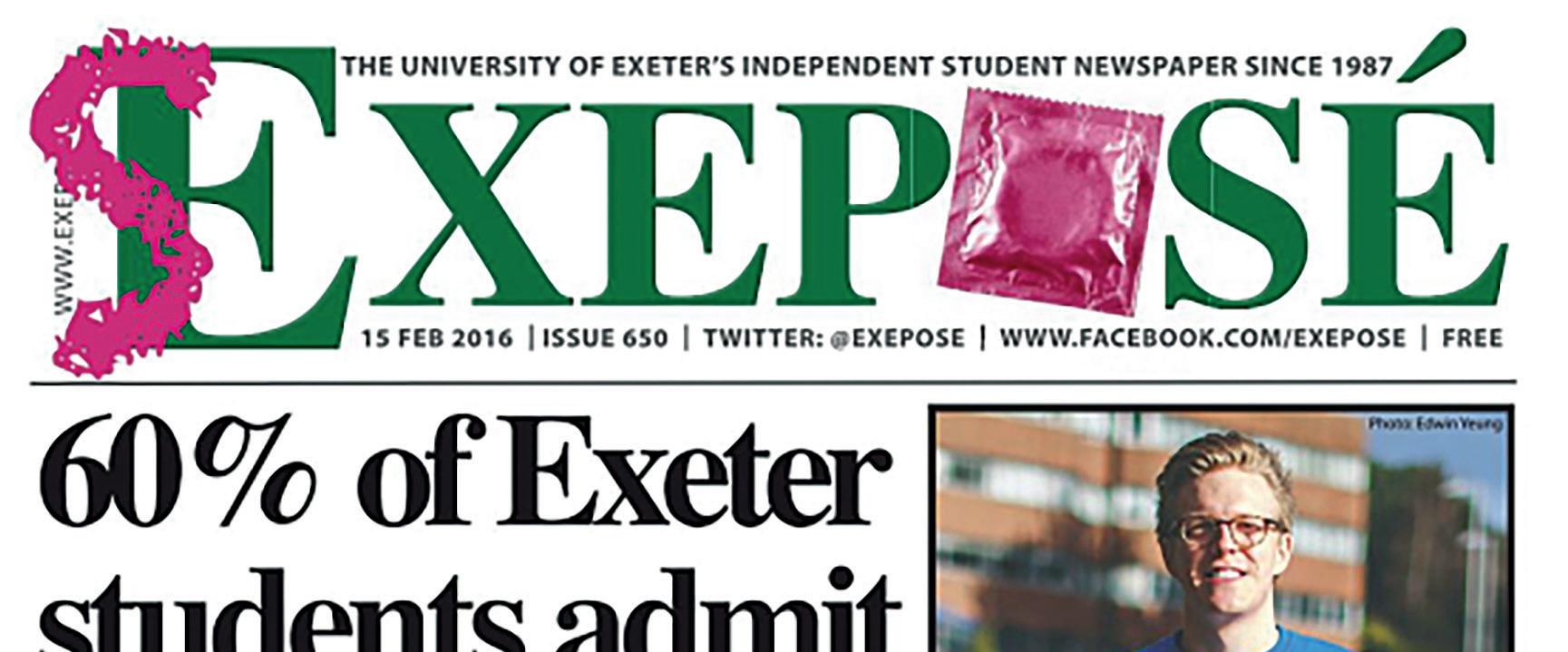
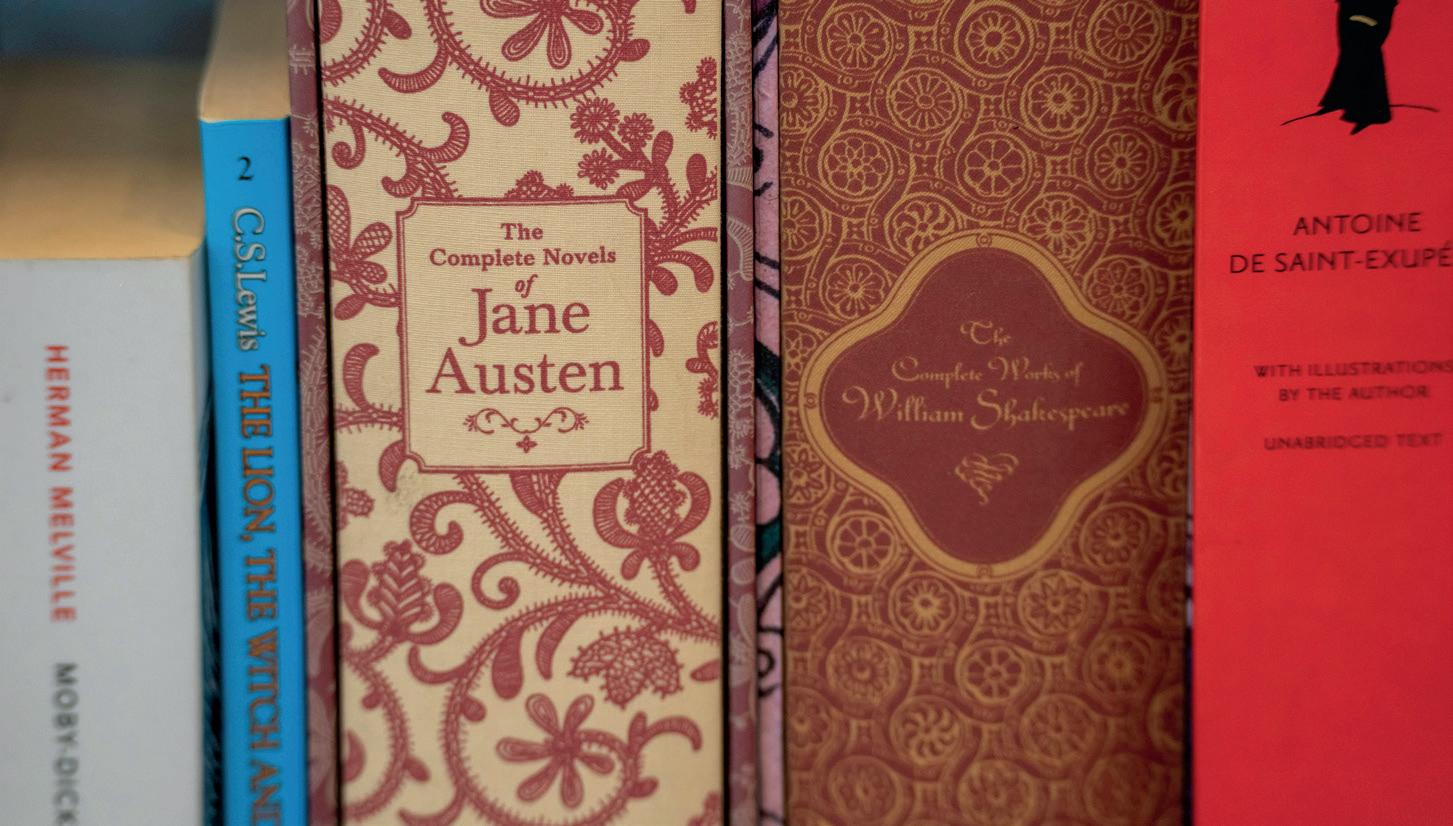


Yasmine Al-Saket tells us about little ways you can show your appreciation for someone you love
WITH Valentine's Day just around the corner, it’s the perfect time to share your love and appreciation with your significant other, friends and loved ones! Whether you’re a hopeless romantic or someone who prefers smaller gestures, there are countless ways to show you care. After all, love isn’t just about grand gestures, it’s often the little, everyday acts that leave the biggest impact.
A great way to show your appreciation is through spending quality time together. In a world where time feels increasingly limited, dedicating even a few hours to your loved ones can mean so much. It could be as simple as sharing a coffee, taking a walk or even sitting in comfortable silence. The key is to be fully present, put away distractions, listen actively and cherish the moment. For couples, carving out intentional time for regular date nights can work wonders. Whether it’s a fancy dinner, a cosy movie night at home or a weekly ritual like studying together, these moments create a sense of connection and consistency. And if you’re feeling adventurous, why not start a new tradition together? Maybe it’s a monthly lunch at the Quay, trying something new together or even a shared playlist you add to over time. These small rituals can become the glue that strengthens your bond.

THESE SMALL RITUALS CAN BECOME THE GLUE THAT STRENGTHENS YOUR BOND
favourite things. These unexpected moments of joy remind them they’re always on your mind.

TTHESE SMALL EFFORTS SHOW THOUGHTFULNESS AND APPRECIATION, AND THEY DON'T GO UNNOTICED.
Morning rituals of love are another beautiful way to show you care. Simple gestures like making coffee for your partner, leaving a sweet note or sending a “good morning” text with a reason you love them can set a positive tone for the day. For those who thrive on acts of service, consider tackling a chore they dislike or surprising them with breakfast in bed. These small efforts show thoughtfulness and appreciation, and they don’t go unnoticed. But love isn’t just about time or gestures, it’s also about the little surprises that keep the spark alive. Imagine your partner finding a heartfelt note tucked in their desk or book. Or perhaps you surprise them with their favourite treat, plan a spontaneous outing or send a care package with all of their
And let’s not forget the power of words. In a world dominated by quick texts, there’s something special about a handwritten love letter. Take the time to recall shared memories, express gratitude for the little things they do or simply tell them why they mean so much to you. If writing isn’t your thing, even a thoughtful voice memo or a shared digital photo album can convey your feelings in a meaningful way.
For those who aren’t big on Valentine’s Day, that’s okay too! Love can be celebrated in countless ways, whether it’s through acts of kindness for strangers, hosting a Galentine’s Day brunch with friends, or simply taking a moment to practise self-love. After all, love isn’t confined to romance. It’s about connection, appreciation and gratitude in all its forms.
So this Valentine’s Day, think beyond the chocolates and flowers. Whether it’s through a morning ritual, a surprise note or simply being fully present, find ways to show your love in a way that feels authentic to you. Because at the end of the day, it’s the little acts of love. The ones that come from the heart, that truly make all the difference

HE stigma surrounding sex toys never ceases to amaze me. How is it we can make something so enjoyable carry such a negative reputation when the sole aim is pleasure? All too often, curious shoppers will cower in the corner of stores such as Ann Summers or hover over their shopping basket on the Lovehoney website in fear of judgement for simply fulfilling their needs.

HOW IS IT WE CAN MAKE SOMETHING SO ENJOYABLE CARRY SUCH A NEGATIVE REPUTATION?
Inherently, there is nothing provocative about sex toys — they form a wholesome part of both solo sex and sex with partners. Also, they often provide a more exciting and enjoyable experience: in a group study, CNN reported that 36 per cent of participants who have clitorises, require clitoral stimulation to reach an orgasm. Sex toy brands keep this firmly in mind when they design and sell their products: facilitating this kind of pleasure has been possible for quite some time now. We need to dig deep into the archives of history to discover why sex toys have become
stigmatised. Typically enhancing the experiences of women (although sex toys are for everyone of all genders), this is the primary reason a label of shame has been attached to it. Biologically, women’s pleasure has been left as an afterthought, as something secondary and unimportant because it isn’t necessary to procreate, whereas men’s pleasure is somewhat still attached to the concept of sexual reproduction. Of course, in 2025, most of us understand the fact that sex shouldn’t be viewed as merely an act for conception, but rath er one for enjoyment as well as for physical health and wellbeing. Another reason sex toys face this stigma is because of their links to masturbation. While sex toys can form a healthy part of sexual bonding between partners, there is no denying that, generally, the stereotype
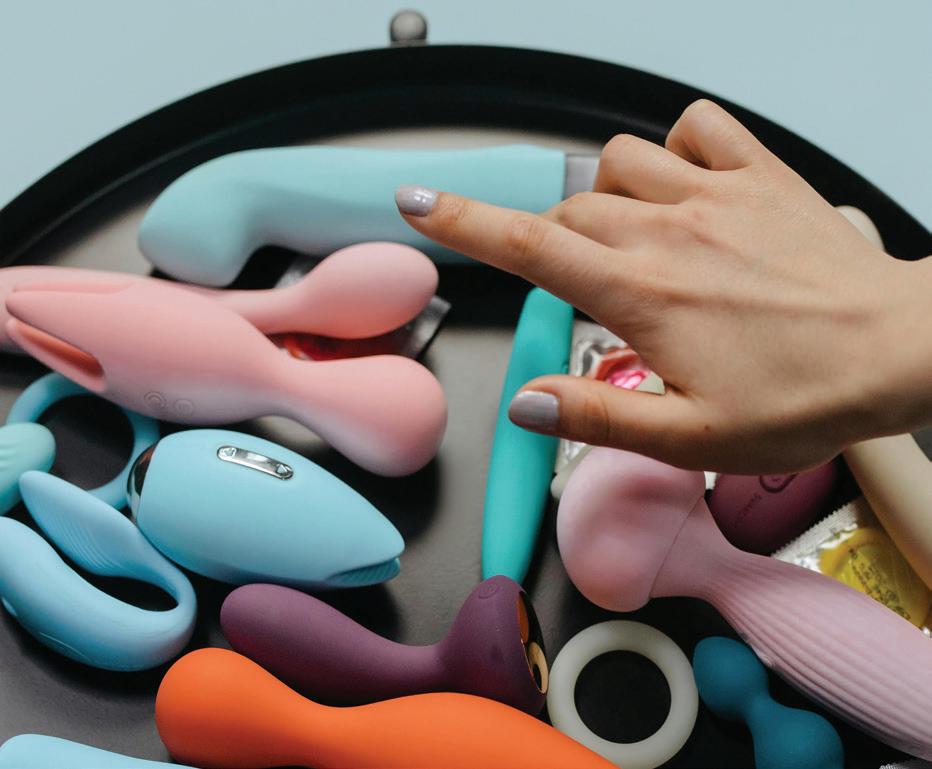
dictates that sex toys are for lonely spinsters who will never be able to find a partner. This is just not true. It is agreeable that they are a great way to connect with your own body, fulfil urges and relax in your own company, but they can also be used to enhance relationships with partners. It is a common joke that for women to reach orgasm, they need magic spells cast on them, a pint of Satan’s blood and for it to be a full moon. And while this is a huge comical exaggeration, there is no smoke without fire as CNN also reports that only 18 per cent of women can reach orgasm from penetrative sex. More needs to be done. Unfortunately, there is only so much one person can do to achieve this and that is where the beauty of sex toys comes into its own. Presenting in all shapes and sizes, there is something for everyone and that is for a very important
reason: sex is to be enjoyed by everyone.

THERE IS SOMETHING FOR EVERYONE AND THAT IS FOR AN IMPORTANT REASON: SEX IS TO BE ENJOYED BY EVERYONE.
Discovering what you enjoy can be linked to the use of sex toys and this is an important part of sexual maturity. Next time you find yourself questioning whether it’s time to get one, that means that it probably is. There is no harm in trying different types and figuring out what is best for you — you just need the confidence to take the leap. Remember that your sexual pleasure comes directly under the umbrella terms of physical health and mental wellbeing; it’s something that deserves attention so you can truly be at one with your body. The next time you’re shopping in town and want to take the step, remember it is one of the most loving things you can do for your body. You never know, sex toys might be just your vibe…


AT its core, Galentine’s Day is about appreciating and nurturing the relationships that sustain us: our friendships. Unlike Valentine’s Day, which often can carry societal expectations of romance, gift-giving and extravagant gestures, Galentine’s Day doesn’t require anything grand. It’s a day to say “I appreciate you,” in a way that feels natural and meaningful. Whether through a heartfelt message, a small gathering, or even a simple coffee date, the focus is on connection rather than obligation.

IT'S A DAY TO SAY "I APPRECIATE YOU"
One of the misconceptions about Galentine’s Day is that it requires lavish gifts or over-the-top celebrations. In reality, the day is about showing love in small, meaningful ways. A handwritten note, a sweet treat or even a fun group activity like a movie night can be just as valuable as any pricey outing. The key is to focus on quality time and genuine appreciation, rather than feeling pressured to impress. Galentine’s Day, for me, is not meant to replace or compete with romantic relationships but rather to complement them. Whilst many say that people often invest a lot of emotional energy into romantic partners at the expense of friendships, I think there is so much to be said for the way that platonic love makes you feel;
it’s even better than romantic love. Sometimes, your friends find the words before you even know you need them. Having a designated day to honour female friendships reinforces the importance of these relationships, ensuring that love and appreciation aren’t solely reserved for romantic interests. It’s a reminder that platonic love is just as significant and fulfilling. It’s a healthy way to say, “I love you, and I’m glad you’re here,” and that can be just as beautiful.

PLATONIC LOVE IS JUST AS SIGNIFICANT AND FULFILLING
Unlike Valentine’s Day, which can sometimes feel stressful or exclusionary for those who are single, Galentine’s Day is an inclusive and flexible celebration. There are no expectations — no need for expensive dinners, elaborate gifts or the pressure to be in a relationship. It’s simply about spending time with the people who bring joy to your life. Whether it’s brunch with friends, a cozy night in or a heartfelt phone call, Galentine’s Day is whatever you make it. Rather than seeing Galentine’s Day as an added pressure, it should be viewed as an opportunity. It’s a chance to reconnect with friends, express gratitude and celebrate love in a broader, more inclusive sense. In a world that often prioritises romantic love, taking a day to uplift and cherish female friendships is
Bnot only refreshing but also deeply meaningful.

TAKING A DAY TO UPLIFT AND CHERISH FEMALE FRIENDSHIPS
So, whether you go all out with a celebration or keep it low-key, Galentine’s Day is a reminder that love comes in many forms. It doesn’t have to be expensive, grand, or stressful — it just has to be real
Kaboompics.com, Pexels

Bella Maclusky, Features Editor, urges us to log out (of the dating apps) and get back out there
UMBLE defines dating fatigue as "a burned out emotional state in which you feel disillusioned, unmotivated and completely over the whole ‘searching for the one’ journey” This is spreading from 30-year-olds to university students. But why are we struggling with romance when we are supposed to be enjoying the time of our lives?

DISILLUSIONED, UNMOTIVATED AND COMPLETELY OVER THE WHOLE 'SEARCHING FOR THE ONE' JOURNEY.
Students are surrounded by thousands of like-minded peers. Socialising is made easy through overlapping friend networks, sport socials and shared spaces. Theoretically, this is the perfect environment to stumble into your next relationship. Yet, only 32 per cent of university students are in relationships, and 11 per cent are voluntarily celibate. Parents tell stories of blissful university experiences and meet-cutes that resulted in life-long marriages. This model seems to have been rendered irrelevant by Silicon Valley’s al-

gorithmic romance revolution. Snap decisions and poorly phrased profiles eliminate potential matches in a matter of seconds on dating apps. While Hinge markets itself as “the app made to be deleted”, at university, it’s better described as the app of hook-ups and awkward encounters. Meanwhile, Bumble has attempted to tackle dating fatigue by targeting the individual user, urging us to set boundaries and not take rejection too personally. But rejection is inherently personal when your profile,
designed to sell your most precious commodity — yourself — feels like yet another job application. If thousands are suffering from dating fatigue, surely the issue lies with the environment, not the individual?
Even if we try to ‘dismiss our anxious assumptions about why a date went badly’, this isn’t the whole story. In the 60s most were married by 20-25 and had children shortly after — yet today, it is common to describe going out together in daylight as a bigger relationship step than physical intimacy. Older generations might condemn hookup culture, but this isn’t necessarily the primary issue. We just aren’t meeting partners organically anymore.
Dating apps remove the fun from dating. After wasting weeks chatting online, you know within the first second if there is chemistry. Algorithms cannot estimate the key ingredient — chemistry; we end up meeting matches we’d have rejected if we’d met in person — whilst rejecting those we might have felt a spark with.
It’s time we all log out and get back out there — to bars, socials and clubs. Exeter has plenty to offer; the Old Firehouse, Turk’s Head and The Black Horse are all happy hunting grounds. Never mind the wealth of clubs & societies.
As for pubs — the more crowded, the
better. Being in bars and small spaces forces interaction with strangers you might never have talked to. The love of your life probably isn’t in Timepiece, but he isn’t marketing himself on an app either. Your parents might have swiped left on their would-be spouse and you’d never have existed if they’d been around in 2025. Instead of standing on a train platform scrolling and swiping on Hinge, look up at the people around you. It seems it’s time we all strike out on dating apps, and go back to our roots. Let in-person chemistry guide you away from another disaster date...

GET BACK OUT TO BARS, SOCIALS AND CLUBS

Lucy Parsons
on the the popularity of tragic romances in literature
ON the topic of romance in this week’s Valentine’s edition, I began thinking about some of my favourite romance novels and what has made them so successfully memorable. While classic, happy-ending romances might offer a level of comfort, it seems that the most pervasively powerful artistic expressions of love are those that do not end the way we might wish them to. Unrequited love, longing and heartbreak generate art that mirror real, complex human emotion and often a timeless relatability.
While classic love stories and poetry have maintained their popularity, multiple factors might contribute to their growing unrelatability and thus emotional grip on a modern readership.
The presentation of women in romantic literature, for example, has shifted dramatically from 19th century portrayals of desirability, in which virginity and purity were highly regarded and reductively intertwined with their personality. Society has also seen considerable developments in the way we form relationships, with what we look for in a partner far less rooted in mundane patriarchal stereotypes. The romance in these novels might be enjoyed retrospectively, but they arguably won’t elicit the kind of reaction they might have done in their time. So, it could be argued that we don’t fall in love the way we used to. But has much changed about how we fall out of it? It seems, to me, as though there’s something unchanging about
heartbreak in fiction. There’s something far more contemporary about it too, with rates of divorce having been on the rise since the start of the 20th century. It’s a dismal statistic, though it’s also telling of wider social development. Women are far more independent and career-focused, and with growing technological advancements and opportunities for travel, there are far more instances for relationship breakdowns.
We might, then, find literature depicting heartbreak far more poignant for its inescapable realism. I remember reading The Great Gatsby and feeling that despite the obvious blankets of contextual differences between anyone and Gatsby, there was something tragically relatable

about his blind urge to become someone who Daisy would love. Lovesickness and insecurity are timeless themes and continually, they will inspire the kind of language that has you flicking back a few pages just to read their lines again. Call Me By Your Name by André Aciman and the monologues of Laurie in Little Women are perfect examples of how such raw human emotion can be so beautifully conveyed in these conditions of heartbreak. So, if you’re going through a break-up this Valentines, or pining after a hopeless crush, there are a wealth of novels with all the words to describe how you’re feeling, from Shakespeare to Sally Rooney. You’re not alone!
Arts and Lit writers with a recommendation for every heart on Valentine’s Day
THE Orange describes a simple day in the life of the poet, enjoying time spent with friends and the small successes of completing daily activities. The concluding line of the poem “I love you. I’m glad I exist”, perfectly encapsulates the contentment that comes with selfacceptance, and practising self-care.
For me, the poem is short, sweet and perfectly epitomises the joy of existing and finding happiness in small things every day. At its heart, it is a poem about gratitude and love for yourself and others. I often find myself reaching for this poem when I feel low, as a reminder of all the small things life brings us that can be fulfilling. Though the poem has an energy best suited to spring, I also enjoy reading it in winter or when the weather is bad (very often in Exeter), as a way of reminding myself of the warmth and light of the upcoming seasons when you can enjoy going outside for a picnic or walk. I love the simplicity and rhythm of this poem, something that Cope also does well in a lot of her more comedic poetry. She seems to have an innate ability to capture the joy of simply being in a few words, without seeming pretentious or cliché. The poem reminds me that happiness is not a destination, and that accepting yourself and where you are in the moment is simpler than we believe. The Orange remains for me a warm beacon of sunlight in difficult times.
A tragic love story: One Day by David Nicholls
NOTHING feels more crushing than reading a book in which a romantic relationship is doomed. The thought that nothing can be done now while also knowing that so much could have been different to prevent it at the time feels existential. David Nicholls’s One Day (also a series and a film) is no exception to this and can teach us many lessons as young people. Dexter and Emma’s relationship progresses very slowly throughout the course of the novel; they find themselves constantly missing one another, like ships passing in the night but this goes on for years. It commences with them on their graduation day and continues for 20 years. Throughout the whole book, you’re yearning for one of them to cross the boundary into vulnerability so that they can be together and when they finally do, disaster strikes. It brings us to a forceful realisation that the modern day “shooting your shot while you still have the chance” rings so true. There is no space in life for asking “what if?” because the opportunity may never arise again. Dexter and Emma are each other’s lifelines — they care so deeply about one another but Emma cares too fast and Dexter cares too late. It’s a tragic love story but it’s a lesson in a million different important things. Some chances in life (be it with jobs, university or a person you fall in love with) come to pass and they generally don’t come to pause. Making the most out of the present moment is the way we come to deal with Dexter and Emma’s story and it should be how the rest of us proceed in life because as David Nicholls says himself: “Whatever happens tomorrow; we had today.”
MARC Chagall was a penniless art student when he met Bella Rosenfeld, the daughter of a wealthy Jewish jeweller, in their hometown of Vitebsk, Belarus. Reflecting upon this first encounter in the summer of 1909, Chagall writes in his autobiography: “Her silence is mine, her eyes mine. It is as if she knows everything about my childhood, my present, my future, as if she can see right through me.” Bella in turn wrote that “when you did catch a glimpse of his eyes, they were as blue as if they’d fallen out of the sky.” Despite opposition from her parents, they married in 1915 and The Birthday (oil on cardboard) was painted in the same year, in anticipation of their wedding. It depicts a euphoric, gravity-defying love that knows no bounds, as the suspended couple swirl dreamlike towards the open window. Although perhaps not materialistically rich, their love for one another is all they require to be happy, as suggested by the informality of the domestic setting, coupled with the simple furnishings typical of Russian provincial tastes. Upon her death in 1944, Chagall — devastated and unable to work for many months — dedicated himself to illustrating Bella’s memoir, The Burning Light which she had completed a few days prior to her death. Together they had lived through war and persecution. But what had allowed them to survive was their undying love and the similar, unique way of viewing the world that they shared. Bella remained Chagall’s muse and inspiration until his death in 1985.

FOR those who would like to sink their teeth into a novel that emphasises the importance of platonic and family love this Valentine’s Day, Maggie O’Farrell’s Hamnet should be at the top of their list. The heart-wrenching novel is set in Stratford-upon-Avon in the late 16th century, where a young William Shakespeare falls in love and starts a family before chasing his playwright dreams in London. Agnes, his wife, stays behind with three children: a daughter, Suzanna, and the twins, Judith and Hamnet. Whilst the first third of the novel delves into the romantic relationship between Shakespeare and his wife, the rest of the novel centres around the life and death of their 11-year-old son Hamnet, and the profound grief that takes over his family. Through the death of the boy, O’Farrell offers a fictional account of the inspiration for Shakespeare’s most famous tragedy. The beauty of Hamnet lies in how it portrays family love in all its forms — motherly, fatherly and, most powerfully, the love between siblings. To save his sister Judith’s life, Hamnet gives up his own. The heartbreak is palpable, yet there is something undeniably heartwarming about the way in which the novel brings these family dynamics to life, especially after a loss. It reminds readers of the strength, resilience and unspoken sacrifices that make family bonds so enduring.
Maggie O’Farrell hits the nail on the head in her portrayal of love and grief. Hamnet is a perfect way to both escape real life and lose yourself in a romantic countryside whilst offering reminders of the real life bonds between people who love.
Judy Dodd and Kayleigh Swart
ROMANCE books are considered the most popular genre for novel readers, but where did they come from and how did we get where we are now? The existence of romance in literature has existed since classical times, although how it has been presented has changed vastly from then to now. In the spirit of Valentine’s Day, here is a quick rundown of the evolution of romance in literature.

To start back in the beginning of classical times, romances were a huge part of many stories. Take the Odyssey for example: much of the story’s plot revolves around Odysseus’s love for his wife Penelope. Many of the Greek myths have romantic ideas such as Eros and Psyche or Orpheus and Eurydice. This representation of Romance is not limited to the Greeks, but is presented in mythology from around the world.
Moving onto the Middle Ages, Medieval Romance became a popular genre, however this genre didn’t actually have to contain
any romance at all. That’s not to say these stories didn’t have any romance in them but that was not their intention. This same theme is followed through into Shakespeare’s period. Comedy plays were a popular genre, and much like Medieval Romance, they had a misleading name too. A comedy play did not have to be funny like we would expect today but instead just had to end in a marriage. So actually, it sounds far more like a romance. Tragic plays often centred around romance too, some famous examples include Romeo and Juliet or The Duchess of Malfi.
For a long time in history, romance was often a heavy influence in stories but not the main purpose of the plot in them. It was not really until after the development of the novel and around the 19th century when romance began to stand out as a genre on its own. The romance genre is often synonymous with Jane Austen’s
Ework with all six of her completed novels falling under this label. Her work has shown how these ideas of love are really universal and not time specific. Audiences today are still falling in love with Mr Darcy. After her, other writers such as the Brontës cemented romance as a popular and thriving genre, which hasn’t really changed since.
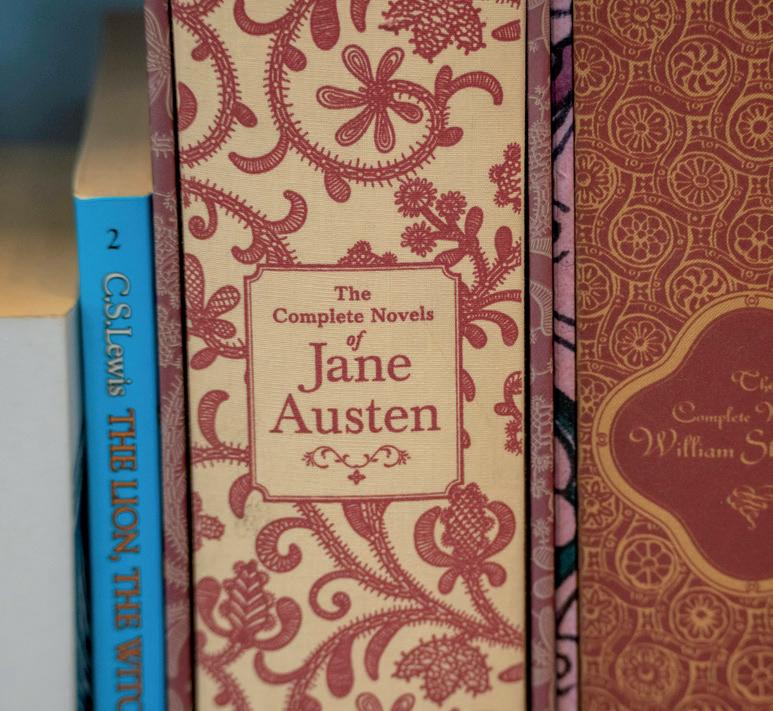
Nowadays the romance genre has exploded even more, this has been helped with both the lack of censorship that used to control literature but also the changes in technology. For most of history, writers were restrained by what they were allowed to write about and publish, however now that is less of a problem. This had led to the rise of erotic fiction, which is in itself a sub-genre of romance, however most adult romances contain an element of erotica in them. Moreover, the changes in society have also allowed
queer romances to become published and popular. While throughout history there are many instances of insinuation to queer relationships, these representations are now allowed to be an open part of the genre. Advancements in technology have also changed the romance genre. The rise of the Kindle and self-publishing books has allowed anyone who wishes to be able to write and publish books. The most popular genre for doing so has been romance. While most of its current readers and writers remain women, men have started to become more involved in the genre. RWA estimates that 18 per cent of romance readers are men. However, romance has and continues to be a genre marketed and aimed towards women. By all estimates it seems that romance is going to continue its popularity. Romance has always seemed to be a central part of all stories we have told throughout humanity and will probably continue to do so.

IT SEEMS THAT ROMANCE IS GOING TO CONTINUE ITS POPULARITY
XETER is a city which prides itself on its arts community — a UNESCO City of Literature, a University city boasting 10 theatre societies to date — but the elitism of local theatre industries continues to ensure an uphill battle for those who want to make something of their art. For the neurodiverse community in particular, whose skills and abilities are often undermined, local theatre poses the opportunity to join a network of passionate and like-minded individuals. Sarah White and Philip Kingslan John are working from the fringe of Exeter’s theatre industry to transform local theatre in the spirit of inclusivity.
Philip opened up to Exeposé about his journey “teaching young people in multi-sensory ways” as part of a “creative endeavour” to cut through the elitism of theatre. His own theatrical journey started in his 20s. He had “fallen into that belief that a career in the arts wasn’t really viable,” but his “great desire to do something artistic” encouraged him to balance his passion for amateur dramatics — or am-dram, as it’s often known — with his teaching job in London. For Philip, the am-dram community was one which refused to conform to the elitist standards of the theatre industry. “Amdram has that kind of community feel to it,” he told us. “Everybody helps each other out. It was through am-dram that I met Sarah White. She and I both had day jobs that we weren’t really enjoying.
“We had a desire to create something, but we didn’t call it immersive at first — immersive wasn’t really a concept in the same way that it is now. We wanted to do something which was accessible and provocative, that wasn’t elitist in any way. We wanted to get away from that feeling that you can get in theatre, of it being
an elitist artform.” And thus, Four of Swords was born. Philip and Sarah, co-founders of the company, have used the company as space for immersive, educational and experimental theatre since its debut performance in 2013.
It all started to come together when he met a group named the Pelican Project at a planning meeting for a festival. The festival never actually went ahead, but what did come out of this meeting was his introduction to “a group which was formed to fill the gap for learning-disabled school leavers.” Philip realised he “wanted to engage with the community.” He embodied the Alan Moore mindset.
He continued,“It was through the Pelicans that I met Isobel Jeffrey. That’s how it all snowballed. It was through working with Isobel that we came up with the idea for the Cabaret, which has become a regular thing, and then the idea for the Ambitious Performers. I’ve got her to thank for all of that, she was the catalyst and the inspiration behind it all.”
A local actress, Isobel Jeffery is a veteran performer at a number of Exeter’s venues. Meeting her was enlightening; her ideas and creativity seemed entirely endless. A particular highlight was hearing her plans for the ongoing and locallyaclaimed Madame Thespia’s Deliciously Diverse Cabaret, which has been supported by Exeter Phoenix, Exeter Northcott, The Pelican Project and Libraries Unlimited. She has also appeared in another original production, The Magical Screentest of Isobel Jeffery, which took place in the Exeter Phoenix last May. According to the Exeter Phoenix, it portrays “the heroic, poignant tale of how [Isobel] has worked to overcome learning disabilities and health problems, and
fought to overcome other people’s limiting preconceptions of what she might be capable of.”
Sitting in on the beginning of an Ambitious Performers session, it was impossible to ignore the flow of genuine warmth and creativity the group enables. The story Philip tells is a hopeful one, but behind it is the task of funding a local organisation which a community now relies on, amid closures to significant local venues which serve them. “For ages we only ever got funding from the Arts Council, with the exception of the Wellcome Trust, but latterly we’ve gotten income from a wider range of sources, a few local charities. The big problem is that the smaller local charities don’t often offer a very substantial amount of money. As a freelancer, you’re trying to value your work and your time, and [the funding is sometimes] a problem,” he told us.
As for the venue closures? “I don’t know how Exeter compares to other cities, but I feel like the main problem at the moment is a lack of an alternative, fringe-y, blackbox-y venue. The Bikeshed, where The Bootlegger is now, was amazingly impactful. It was a cool stop-off for small-scale, interesting stuff. Then it closed, consumed by its own ego in a way. MakeTank in Sidwell Street was, again, a valuable and welcoming place. Now that that’s gone, I feel like we need a replacement.”
When asked whether the Northcott has the potential to fill these gaps, Philip responded, “[The Northcott] would like to try to be more fringe-y, but it’s the fact that it’s the Northcott — it’s all kind of tied up. You want something a little bit more irreverent or independent. The Barnfield do cool stuff, but it doesn’t quite have the same feeling as something independent and not beholden to anyone.”
Ambitious Performers has opened doors for creatives in Devon’s neurodiverse community, offering an inclusive space for a diverse group of talented individuals. Philip feels that the work he and Sarah do is “really gratifying, and it shows the power of teaching young people in multi-sensory ways.” Exeter’s theatrical sphere for ambitious neurodiverse people isn’t going away anytime soon, but the need for a fringe-adjacent performance space and consistently reliable funding continues as Ambitious Performers grows in both its numbers and its creative endeavours.

Three Music writers share their favourite classic Valentine's tunes to get you in the romantic mood
'Will You Still Love Me Tomorrow' —
KNOWN best to our generation as the Gilmore Girls ’ intro singer, Carole King has an impressive oeuvre chock-full of worldwide hits that nobody below the age of 40 knows were written by her: ‘Natural Woman’, ‘Beautiful’, and ‘You’ve Got a Friend’ to name a few. Her 1960s classic ‘Will You Still Love Me Tomorrow’ is a sweet, albeit bitterly so, love song. Its original rendition performed by The Shirelles is upbeat, mixing the tender sentiments one feels towards their new lover with the exciting worries of how whether a blossoming relationship will continue to grow so strongly tomorrow as it does today. If slow dancing is your thing, King’s own, mellower version off of her album Tapestry makes for a great backing to swaying (even if a little awkwardly) in your partner’s arms.
Audrey Alvey, Satire Editor
F'Can't
RANKIE Valli's 'Can't Take My Eyes Off You' is an iconic Valentine’s Day anthem and wedding day classic, blending heartfelt lyrics with a timeless melody that perfectly captures the euphoria of love. Released in 1967, its passionate and soulful delivery makes an irresistible declaration of love that transcends time. The song’s romantic appeal is reinforced by its iconic use in films like 10 Things I Hate About You , where Heath Ledger’s unforgettable serenade makes it a symbol of grand romantic gestures. Also featured Bridget Jones's Diary , when Bridget first meets future love interest Mark Darcy, the song carries deep emotional resonance. Decades later, it remains a quintessential soundtrack for love.

TKatya
ELVIS. One of the most famous singers to ever live — and what song is more romantic than his most well-known, 'Can’t Help Falling in Love'. This Valentine’s Day, I implore you to listen to this beautiful song with your partner and feel the love that oozes so elegantly from it. This love song encompasses a repetitive nature, both in the lyrics and the melody, but is the reason why it is immediately recognisable. It’s truly a timeless song, even after over 60 years, and I would argue it is one of the most romantic songs to have ever been made.

Gracie Moore, Editor-In-Chief, talks to Exeter's most infamous DJ about his life in the music industry
HE elusive DJ behind our favourite nights out in toptop of Timepiece and the floors of Fever room two, was in conversation with Exeposé about his career in DJing, how he got to where he is now and his plans for the future.
Sam (although it feels weird using his real name) started by going into great detail about how during his heyday at school, he was a “goth kid with long hair” who always used to wear slipknot vests. One day, when tasked with creating a CV for his dream job, he revealed (among a sea of boys wanting to be footballers) that he wanted to be a DJ. Starting off as a glass collector — along with many other less glamorous jobs — at a nightclub in Torquay, he never looked back from the nightclub scene.
Sam confessed to me that originally, his favourite genres of music to listen to and play were the “200 per cent pace” examples of EDM and D&B but now prefers the cheesy pop that he claims Exeter students also love: “it’s my guilty pleasure and I love everything that will get students going.” Sam also told me that his favourite guest to have perform with him was Sammy Virji.

IT'S MY GUILTY PLEASURE AND I LOVE EVERYTHING THAT WILL GET STUDENTS GOING
DJing in Exeter is preferred to the more quiet location of Torquay because Mr. Dirty Beat himself knows a lot of people in Torquay whereas Exeter is the more lively and varied of the two. His peak times for working are notably during term time but when asked about the goings-on out of term, I was told the
summer is where Newquay comes in. Due to the influx of sailors to the area, there is never a dull day when you’re Sam Gilbert.
Every year, you wouldn’t be far off if you’ve seen the iconic sets from Sam in the tents of EGB, Exeter’s most known and loved ball. Being on the inside of the EGB rumblings, I was told that there will be an extra 1,000 tickets sold for EGB this year and that the ticket selling kerfuffle from last year has already been sorted, way in advance of the release day. In the most wholesome way possible, Sam tells me that it amazes him how people actually know and recognise him. To him, DJing isn’t a job: it’s something he thoroughly enjoys and gets a lot out of — “I’m just pressing a few buttons and stu- dents seem to love it.”

“Even pre - paring my decks and setting up feels amazing. If you make your hobby your job, you’ll never work a day in your life.”
DJing as a profession has changed drastically since the 20th century but has even shifted quite notably in the last few years.
When I asked for specifics, Sam mentioned that “it’s definitely a lot easier now. The existence of TikTok means that you can build publicity from social media.” He also went on to add that “everyone wants to DJ but they sometimes don’t even know the basics. There are guys I know that are great DJs but don’t get the exposure because they don’t have an image but the lad with thousands of followers on TikTok gets the reputation.”

EVEN PREPARING MY DECKS AND SETTING UP FEELS AMAZING. IF YOU MAKE YOUR HOBBY YOUR JOB, YOU'LL NEVER WORK A DAY IN YOUR LIFE
In regard to future aspirations, Sam recently found out after appearing on the popular podcast Rumour Has It that the Bristolbased job he discussed as really wanting, has been confirmed. To be DJing in a big city is great kudos for the smalltown boy.
Finally, Sam mentioned his experiences with working with 4Play, the organiser of many nights out and events in Exeter. He says that “they go out of their way to make sure everyone is happy (including students),” and most importantly, “Exeter’s nightlife would be nowhere without 4Play.”
With all the feedback he receives, Sam is beyond grateful for the support. While he doesn’t do it for fame, to have his passion recognised as a talent is “a huge deal.”
“If people are coming and staying to dance all night, it’s a job well done.”
Rosie Peters-McDonald, Deputy Editor, reviews Sid Plus One's recent gig as they climb to campus fame
THE Old Firehouse crowd couldn’t have asked for a better performance from Sid Plus One on Saturday the 25th January. Featuring multiple originals alongside a few accompanying covers, the band brought the venue to life as friends and fans attempted to bustle their way to the front of the crowd.
The band is fronted by lead singer-songwriter Jas (who is also President of Campus Bands for 2024/25), alongside its namesake Sid on Guitar, Ben on drums and Bert on bass. The setlist included covers the likes of Nena’s ‘99 Red Balloons’, Boa’s ‘Duvet’ and Deee-Lite’s ‘Groove is in the Heart,’ alongside the crowd-pleasing ‘Teenage Dirtbag,’ originally by Wheatus, in the encore. Opening with ‘99 Red Balloons’, Sid Plus One started as they meant to continue: with an authentic and alternative sound, balancing upbeat song choices with Jas’s smooth and psychedelic vocals.
On choosing which songs to cover, bassist Bert told Exeposé, “with ‘99 Red Bal-
loons’ I just really liked it and thought we would do a great job.” As for ‘Groove is in the Heart,’ Bert told us he “really liked the bass line,” with Jas adding, “with covers, we like to pick stuff with wide appeal, but also stuff that other bands don’t tend to do as much.” As for ‘Teenage Dirtbag’? “That one’s just pandering,” Jas joked. She added, “Since we started doing more originals we choose covers that fit the direction we’re going in, whereas before it would just be songs we like listening to and want to play.” A personal favourite of mine was ‘Duvet,’ which I felt perfectly fitted Jas’s style.
The on-stage chemistry between the band members was real and added to their authentic sound. Their originals in particular were gold. A spectator at the gig told us, “I’ve never seen such excitement for an original at a gig. 'Rat King' popped off.”
Having been there myself, I can attest to this (I may have witnessed a Jubel glass or two shatter as the crowd jumped for the chorus). Mattie Gazzard, Head of Music at
Xpression FM, added, "Sid Plus One show so much promise as a band, and their debut single Rat King is a perfect example of their collective talent as performers."
Jas opened up on the creative process behind Sid Plus One’s original songs: “Sid comes up with riffs, but we usually collaborate for structure and the general vibe of the song. Then I (Jas) will usually write lyrics and the melody but we also edit and change bits together. At the moment ‘Pseudoromance’ is our favourite original to play live (and in general).” Those who also loved ‘Pseudoromance’ will be happy to know that Sid Plus One are in the process of sorting its cover art and release date.
In stage presence, vocals and general vibes, Sid Plus One were a joy to see at The Old Firehouse. They're next performing at South West Does It Best in the Exeter Phoenix on the 8th March, and we can't wait to see them there.
Rebecca Aparicio Vega looks at a love song dedicated to a more unconventional romantic relationship
JOAN Baez, a folk musician often nicknamed the ‘barefoot Madonna’, wrote ‘Diamonds and Rust’ about her on-and-off, unconventionally intense relationship with Bob Dylan, which started as an affair and turned into a situationship which the two never quite worked out. She introduced Dylan to fame, by singing duets with him when she was already a star and he, "already a legend", and quickly rose to stardom. Baez relates how she "got lost in the shuffle" as Dylan dealt with new lovers and musical experimentation. However, their love never truly died, as she "loved him dearly" and still recalls the sweetness of their connection. She sings about the all too familiar situationship, which hurts the most and lingers the longest.


Isabella Yates on the actor's unique apperance as musical guest
many of which were already established musicians rather than actors, but despite this, Chalamet delivers a stellar performance. During his opening monologue Chalamet announces that “you might not know the Bob Dylan songs I’m performing, but they’re my personal favourites”, choosing ‘Outlaw Blues’, ‘Three Angels’ and ‘Tomorrow is a long time’. As the host was performing, Chalamet was introduced by surprise guest Adam Sandler, into strobe lights illuminating Chalamet jaunting around the stage with a winter coat (hood up) and sunglasses (on). From the opening it is very clearly his own voice, rather than his imitation of Dylan’s, which I think offers an insight to the genuine passion Chalamet has for these songs. While his fashion choices and stage presence, in addition to the lighting choices at the beginning feel very deliberate to draw in a younger audience, the essence of the music withstands the modern framing. The acoustic ending also adds to a sincerity in his performance, as well as highlighting his musicality as he plays the guitar throughout.

Setlist — The Old Firehouse, 25/01/25 '99 Red Balloons' 'Pseudoromance' 'Duck Song' 'Groove is in the Heart' 'A Little Longer' 'Symbiotic Relationship Between Animals' 'Rat King' 'Duvet' 'Teenage Dirtbag'
Brooke Taylor, Music Editor, shares her recommendations for your Valentine's playlist
FOR me, ‘Just Like Heaven’ by The Cure will always be the most special love song. It’s not the most conventional of Valentine's tunes, the lyrics can err on the nonsensical side, but anyone who’s been in love can tell you that they know exactly what Robert Smith is singing about when he’s “spinning on that dizzy edge”. It’s the kind of song that you want to dance around the kitchen, or the packed dancefloor of cavern, or around your halls to, looking at the glowing face of someone you can’t get enough of.
WHEN choosing a Fontaines D.C. song for Valentine's Day, ‘I Love You’ from the album Skinty Fia might seem like the obvious choice and it is a great song but I’d actually recommend a single from their most recent album Romance (appropriately named), called ‘Favourite’. The song to me sounds like a fond reflection on how much a special person has changed your life. Many love songs are about the burning hot intensity of new things, but I think ‘Favourite’ is the perfect song to celebrate a longer relationship, the person who has been your favourite for a long time, as the lyrics state.
MY last recommendation for a Valentine’s tune is a bit more mellow, more intimate and soft: Hozier’s cover of ‘Do I Wanna Know?’. The original Arctic Monkeys version is a grungy classic, but Hozier’s cover (live at the BBC) changes that tone completely. The song becomes a gentle yearning lullaby that gives you a warm, comforting feeling when you hear it. It really captures the feeling of desperately hoping for someone special’s presence, the line “was sort of hoping that you’d stay” feels like a moment of raw vulnerability in the song, and you find yourself hoping the singer gets those extra few seconds with the object of his yearning.
and potential setbacks of intimate scenes in film and TV
SEX scenes have been shown on screens since the beginning of cinema. Sometimes they’re artsy while other times they’re graphic and uncomfortable, but they have always been a staple of cinema. However, in recent years, questions about actors’ safety and the need for these scenes has come into question. To discuss this, you need to go back to the beginning of cinema and look at how the development of sex on screen has evolved. Before the 1930s, sex was regularly depicted on screen. However, after the Great Depression and the rise of more conservative ideas, this all changed. A new code was brought into a large part of the film industry called the Hays Code. This code was a form of regulation which meant many sex scenes or anything that was considered immoral would not be allowed to be shown on screen. This code was eventually scrapped in 1968, bringing with it a new popularity for sex scenes. In the 1970/80s, sex scenes were popular in
films often being found in genres such as thrillers, horror and comedy. However, there was also a rise of pornographic films gaining mainstream success, often being shown in cinemas and reviewed by critics. This practice eventually died out when private viewing became more popular.

ALSO A
By the time the 21st century rolled around, sex scenes were still common and popular in films. However, recent studies are suggesting that these scenes are becoming less common in films. The Guardian reports that since 2000, the appearance of sex scenes in film has dropped by 40 per cent. One of the big factors in this is that actors have started setting boundaries and adding clauses in
their contracts to prevent them from taking part in these scenes. In an interview with Variety, Penn Badgley, an actor known for his roles in Gossip Girl and You, stated that he no longer wants to do such intimate scenes because of the respect he has for his relationship. In addition, there has been growing concerns about how necessary sex scenes are for movies, many finding them unnecessary and uncomfortable. There have been questions about if these scenes are relevant at all. However, it can also be argued that these scenes can help open up discussions about sex and build a more sex-positive society.
Nowadays there is no one standard representation of sex on screen. For example, the Netflix show Sex Education focuses on realistic scenes and presenting underrepresented relationships. Likewise, the show Bridgerton has been praised for its show of scenes including masturbation and queer relationships. However, to look on the other side, the TV show Euphoria also shows sex

scenes but in a far more graphic and sometimes disturbing way. There have also been questions as to whether films such as Fifty Shades of Grey, are positive representations of sex or whether they just normalise extreme sexual ideas. Much like in real life, sex on screen is complicated and there is no right answer to if it deserves a place in cinema. The representation of sex has the ability to help open up conversations about awkward or embarrassing ideas, but it also has the ability to do more harm than good, depending on how it is portrayed.
Screen writers recommend their favourite RomComs to get you ready for Valentine’s Day
WHEN HARRY MET SALLY is considered the original RomCom, embellishing a timeless love story with wit and charm. Set over 12 years, the friends-to-lovers plot explores the age old question — can guys and girls just be friends? Despite the myriad of dodgy 80s haircuts, Sally instantly captures audiences hearts, with her high maintenance attitude; charming both viewers and eventually Harry Albright! The New York scenery and American swing soundtrack makes this movie the perfect RomCom to cosy up to on a rainy day, but remember to have your popcorn — on the side!




UNCH-DRUNK LOVE focuses on Barry, a socially anxious businessman struggling with loneliness and anxiety. However, upon meeting and falling in love with Lena, he gains the confidence to finally stand up for himself and sees his life improve as a result. Barry is a really endearing lead character; his initial struggles are very relatable, and it makes it satisfying to see his life change for the better. It’s directed and edited in a very chaotic man ner, reflecting Barry’s anxious mindset and the unconventional central romance perfectly. It’s a strange yet wonderful experience, and a true gem in the romantic genre.

NGrace Roberts




Joseph James
OBODY puts Dirty Dancing in a corner. Backed by an iconic soundtrack and capturing the saturated late summer colours of North Carolina and Virginia, the film has had a legacy in pop culture that is easily recognisable. The film follows Baby, (Jennifer Grey) as she is taken unwillingly by her family on a resort holiday in the Catskills, where she meets Patrick Swayze’s Johnny. The film manages to depict heavy themes, tackling abortion and misogyny, class and family without become preachy or too dark. The film ends on a beautifully bittersweet note, portraying the terrifying, exciting moment of standing at the cusp of adulthood, where the world suddenly opens up. It is also worth noting that the director, Emile Ardolino (who tragically died of complications with AIDS), has an incredibly sweet back catalogue that is worth looking into, including Sister Act. I thoroughly recommend Dirty Dancing; though do not, under any circumstance, watch the 2004 sequel. Bronwyn Payne, Online Screen Editor
Beth Donovan examines the downfall of RomComs and whether they should make a comeback
HE 2000s were undoubtedly the Golden Age of RomComs, with iconic films like Love Actually (2003) and The Proposal (2009) dominating the box office and providing a constant stream of feel-good entertainment. New RomComs were being released constantly, and audiences flocked to the cinemas to watch yet another predictable but heartwarming tale of girl meets boy. Recently, however, we’ve seen a massive decline in production of RomComs, posing a question over why fewer films within this genre are hitting the big screen. Perhaps a reason for the decline is a shift in audience preferences. While RomComs once thrived on idealised portrayals of romance, audiences are currently looking for something more authentic. In a time when social attitudes are evolving rapidly, RomComs have
struggled to keep pace with the more progressive, inclusive narratives. The genre, often relying on heteronormative relationships and dated gender roles, feels out of step with modern sensibilities. Furthermore, RomComs became too formulaic. The tropes are so well-known — a meet-cute, misunderstandings and grand gestures of love — audiences can often figure out the plot within minutes. This sense of predictability has led to fewer people bothering to watch, and so lowering box office numbers and sub-

sequently theatrical releases. But absence can make the heart grow fonder, and audiences seem to be craving the simplicity and warmth of a feel-good love story. After some years of more serious content, a lighter, more hopeful genre like RomComs could fill that void. Crazy Rich Asians (2018) breathed new life into the genre with its female-led, more diverse story, proving the RomCom can still be popular when portraying a fresh take on romance with more varied cultural perspectives.
Additionally, the upcoming release of
Bridget Jones: Mad about the Boy could signal a return to the classic RomCom formula, leaning into nostalgia for fans of the original trilogy through the return of key characters like Daniel Cleaver (Hugh Grant) and Mark Darcy (Colin Firth). As well as this, Bridget’s relatable imperfections could represent a more grounded form of RomCom that would appeal to modern audiences looking for something that feels both comforting and relevant. So, while the RomCom genre has faced challenges, there’s clear potential for a resurgence. While the predictable, over-glossy formulas have begun to feel stale, a focus on diversity, relatable characters and a sprinkle of nostalgia will ensure RomComs once again captivate audiences. The demand for feel-good,authentic love stories makes the genre primed for a comeback.
Charlie McCormack, Screen Editor, reflects on the show in light of the new season’s release
INVINCIBLE stands alongside The Boys as the most popular out of the lieu of ‘adult-gritty-superhero’ media that seemed to all spawn around the time everyone started getting really sick of Marvel.
The comics, whilst successful, weren’t exactly mainstream. Many viewers, myself included, weren’t familiar with the comics and the show’s first ( and best ) season capitalised on this. The tone of the first episode carried with it the kind of generic superhero notes we had all come to expect at the time. This, and the animated nature of the show, fed in to a false sense of security under this ‘childish’ cloak. This cloak of course would get ripped to shreds in the last minutes of the episode, hooking most of us in for a great season.

MANY VIEWERS WEREN’T FAMILIAR WITH THE COMICS AND THE SHOW’S FIRST ( AND BEST ) SEASON CAPITALISED ON THIS
Despite this, season one certainly had its dips. The relationship with Amber was a particular pain point for viewers, tensions seemed to erupt inorganically and unreasonably. They remedied this in season two, but fairly inelegantly. Amber’s character effectively had a personality transplant. Whilst her more reasonable season two personality made much more

sense, the disparity between this and how she acted in the first season made this development incredibly jarring as a viewer.
The first season thrived on the relationship between Mark and his father. Figuring out Nolan’s (Omni-Man’s) motives hooked us in, and the payoff seen in how it changed his relationship with Mark formed the emotional (and physical) climax of season one’s finale. It’s no coincidence this remains the show’s highest-rated episode on IMDB, standing proud with a 9.7. This is helped in no small part by a powerhouse voice-acting display from both Steven Yuen (Mark) and J. K. Simmons (Nolan).
Perhaps then it was the absence of Omni-Man that lent to the sense of ‘lacking’ the first episodes of season two carried for me. Maybe the odd choice to split the release of the season across November 2023 and March 2024 stunted the season’s momentum? The pace did eventually pick up and it’s no coincidence this happened around the same time Omni-Man was reintroduced. For me, the show’s best moments still came in cultivating the fraught father-son dynamic.
Season two left me whelmed . I’d say the lows weren’t as low as they were in season one, but the highs also weren’t as high. That’s not to say these highs weren’t great. Season two’s final arc deftly introduces a new long-term villain and strums a powerful chord for challenging Mark’s character going forward. I think the issue with season two was more the growing pains of problems I felt lurking even in season one. The show at times felt tonally grounded, with
Tsharp, real dialogue, yet in many moments I found myself acutely aware of generic lines present in 100 other superhero stories.

SEASON TWO LEFT ME WHELMED. THE LOWS WEREN’T AS LOW AS SEASON ONE, BUT THE HIGHS ALSO WEREN’T AS HIGH
The animation too, began to grind on me, as it has for others. It is by no means bad, but with the critical success the series has seen, it feels odd to not see a noticeable improvement. The promotional materials shown for season three show no indications of this changing so I fear this is something fans will just have to accept.
Anyway, with big name actors like Aaron Paul and Simu Liu (amongst others) having their name attached to season three, it seems the studio is more concerned with spending its budget on star-power than animation quality. They’ve certainly assembled an all-star voice cast, it’ll be a shame if the visuals can’t keep up. I am excited for season three. Comic fans tell me if this season covers what they think it will, we’ll be in for a treat. The question isn’t “will season three will be good?” it’s “will it be great?”

THE QUESTION ISN’T “WILL SEASON THREE BE GOOD?” IT’S “WILL IT BE GREAT?”
HE Oscars are always controversial. As someone who is dedicatedly following the Academy Awards for the fourth year now, I understand the sense of alienation the average movie-goer feels during awards season. Bizarre and divisive picks like this year’s Emilia Pérez , a Spanish language musical about a transgender ex cartel leader (and last year’s Poor Things ) are showered in awards, leaving your average film-enjoyer scratching their head, perturbed that fun, crowd-pleasing romps like this year’s Wicked (and last year’s Barbie ) are pushed to the margins. This year, many “Oscar-bait” films are finding themselves in hot water, like The Brutalist , which recently became embroiled in an AI scandal, leaving the door wide open for more left-field films.
The Oscars are about politics; who wins other awards (e.g., the Golden Globes, BAFTA) plays a part, as does individuals’ prior dedication to the industry. Best Picture is the epitome of this political approach. Past winners — like Everything, Everywhere, All at Once (2022), CODA (2021) and Moonlight (2016) — are all emblems of pushing the envelope of what cinema can be by championing new voices and propelling the medium of film to new heights. What wins Best Picture is what the Academy deems should be immortalised in the cinematic canon.


WHAT WINS BEST PICTURE IS WHAT THE ACADEMY DEEMS SHOULD BE IMMORTALISED IN THE CINEMATIC CANON
Perhaps Conclave could be the film this year to take home gold. The papal thriller featuring Ralph Fiennes, Stanley Tucci and Isabelle Rossellini confronts many of the systemic issues within the Catholic Church, through the tense voting process for the next Pope. I oscillate between this and Anora for my choice for Best Picture; both films take pre-existing modes
of filmmaking and turn them on their heads, compelling the viewer to the edge of their seat.
As well as Best Picture, Anora has a strong chance of winning Best Original Screenplay, and Best Actress for Mikey Madison, who portrays the eponymous protagonist, a rambunctious sex worker who becomes romantically involved with the son of a Russian oligarch. Sean Baker’s electric script is an excellent study into what it means to be a sex worker in the modern age and gives Madison a lot to sink her teeth into, both dramatically and comedically. Alternatively, it could be Demi Moore who takes home this win for her performance
in The Substance , a grotesque body horror exploring female beauty standards in Hollywood. Considering she beat Madison for the Golden Globe in January, Moore is a big contender this year, especially given her over 40-year-long commitment to the industry.
This year is also big for younger actors, with Timothée Chalamet’s exceptional performance as Bob Dylan in the biopic A Complete Unknown and Ariana Grande’s glorious appearance in Wicked being my personal picks for Best Actor and Best Supporting Actress respectively. However, Succession ’s Kieran Culkin’s heartbreaking yet humorous performance in A Real Pain , a tale of two cousins embarking on a Holocaust tour around Poland, is perhaps the most surefire win for Best Supporting Actor. Despite these predictions, the Oscars are a celebration of cinema that showcases new films I would not have heard of otherwise ( Nickel Boys and Brazilian film I’m Still Here being examples of this, both of which I’m itching to see!) So regardless of what wins, the Oscars are always my highlight of the film calendar!

REGARDLESS OF WHAT WINS, THE OSCARS ARE ALWAYS MY HIGHLIGHT OF THE FILM CALENDAR
DOOM scrolling through the dating apps, I stop to wonder what all the fuss is about. Sometimes the realisation that I’m sitting and mindlessly playing “smash or pass” on my phone in order to find a partner hits me like a tonne of bricks and I re-delete the apps (I’ll be back on the app store in 3-5 business days.)
“What’s the real issue with being single?” my 50-year-old-married-for-25-years mum asks me while she watches TV with the love of her life. It’s the fear that time is running out, Mum. That’s the problem.
Every single 20-something student has felt this at least once in their time at University: the anxiety of seeing some of your closest friends in happy, committed relationships while you’re in the doldrums waiting for a text back is often hard to overcome.
The only real solution to this is accepting that there is nothing wrong with you. As humans we are inherently perfectly imperfect and the love your friends and family have for you is testa ment to the fact that you are more than loveable.
Finding peace in the single life is difficult when we naturally yearn for validation from everyone around so practising detachment from other people’s opin and judgements can nurture the inner peace needed to make rational choices within the world of dating. Imagine yourself in the dat ing pool as a gardener. If you tend to your gar den, taking really good care of it and allowing it to exude
the right energy to guests and animals, the prettiest butterflies will come and visit the garden.
Also, I like to imagine what my life would be like if I met the love of my life tomorrow. Would I be completely at ease knowing I’ve made the most of my single life while I had the chance? Would I be able to mutually care for this person, who would have to know my deepest, darkest secrets and the inner workings of my mind? In truth, the answer is generally no.
Don’t get comfortable in your misery. Being single should largely be a relief because it means there is time yet to grow and become the best version of yourself. It’s easy to swipe through endless Instagram stories of your friends getting taken out to lavish dinners with their partners, being bought flowers or going on holiday together. Most of that isn’t real. Social media is a highlight reel and what they don’t share is the downsides. Couples argue. There is no couple on this earth that has never argued and this can sometimes be exhausting. Seek solace in your own company, you can spread your wings as wide as you like with no one else to consider while you’re at it. Finally, what is meant for you won’t pass you by. With little bit of patience, a growth mindset and an open heart, they’ll be here in no time. Now go and stretch out on that big double bed that you have all to yourself.

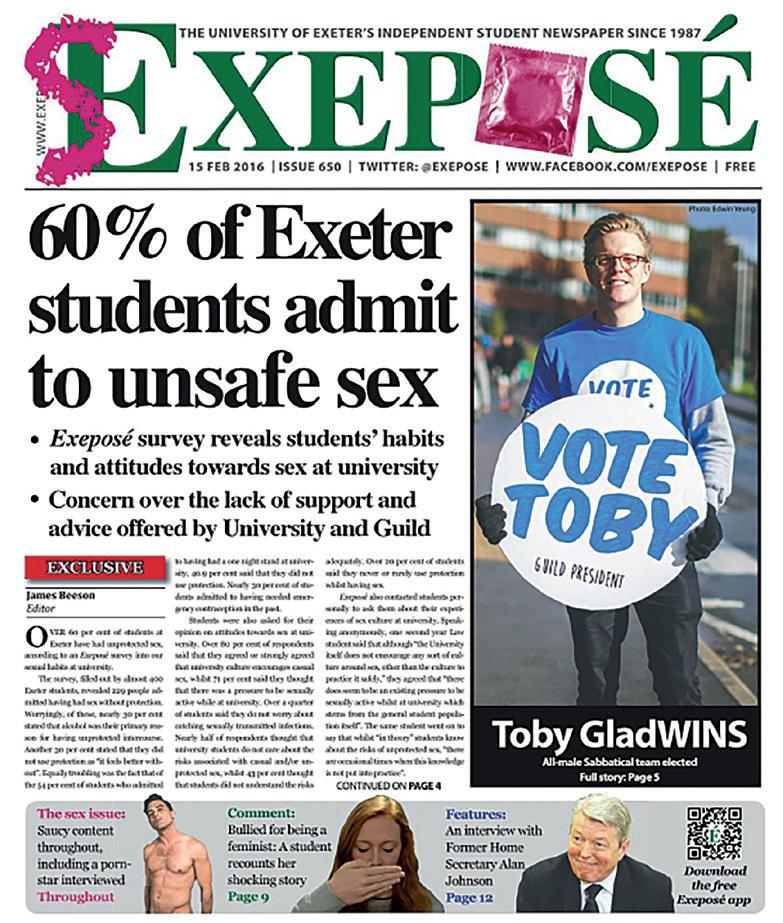
WHAT says love like carrot cake? Probably a whole host of things, but none of those offered such a great title for our Valentine’s edition recipe (If I do say so myself). I’m not sure my Dad’s partner, who I owe this recipe to, would be a fan of the title, but alas.
INGREDIENTS:
1.5 cups light brown sugar, 3 eggs, 1.25 cups of a neutral oil (Binging with Babish fans unite), 2 and a third cups of all-purpose flour, a teaspoon of baking soda, a teaspoon of baking powder, 1 teaspoon of ground sweet cinnamon (and perhaps another for good luck), half a teaspoon of ground ginger, half a teaspoon of salt, and half a teaspoon (or less depending on your taste) of vanilla extract. You’ll also need 3-4 grated carrots (of average size), a handful of shelled walnuts from the baking aisle, and, for decoration, frosting. I opt for cream cheese frosting that’s sugar, butter and cream cheese, whipped. Sidenote: for a smaller, or single-layer cake, you can half those ingredients. This recipe makes a sandwich cake.
Step 1:
Step 2:
Sift and gradually add in the flour, baking soda, baking powder, cinnamon, ginger, vanilla and salt. Keep mixing until it looks like it’s all come together (no lumps, please!).
Step 3:
Add in your carrots (and walnuts, if you have any) and stir in until those are evenly distributed.
Step 4:
Pour the cake mixture into your buttered cake tin(s) and pop ‘em in the oven. Bake for about 25 minutes (though I’d check on them at 20, just to be sure). Once ready, the cake should be golden. You can poke them in the middle with a skewer to see if they’re cooked all the way through.

Preheat your oven to about 165C. While that’s heating, beat together your sugar, eggs and oil. I opt for hand mixing due to lack of an alternative option, but if you’re lucky enough to have a freestanding electric mixer (circa 2015 Zoella Rainbow Cupcake era, IYKYK) I’d use that.
EFORE there was Exeposé , there was Sexeposé . Well, not exactly. Sexeposé ran for two issues in February 2016 and 2017 before seemingly disappearing into the Exeposé archives (a cupboard in the office) forever. Sexposé may have been short-lived, but its focus on sex-positivity and the taboo, messy side of relationships made its mark. Whether it’s an interivew with a local pornstar, the perfect sex playlist or the science of sex, Exeposé’ s writers truly covered all the bases. The cherry on top is of course the excellent use of puns; “Dildos and dildon’ts”, “Sexeter and the City” and “Great Sexpectations” being some personal favourites. The editions touched too on important issues affecting the Exeter community; a
2017 sexual survey explored student perspectives on sexuality outside the dominant university narrative. In particular, LGBTQ+ students faced significant hurdles from discovering and accepting their sexuality to navigating Exeter’s queer dating scene. A survey of over 200 students showed 49 per cent felt pressure to be sexually active, 81 per cent percieved a stigma against sexual promiscuity and 92 per cent believed there is a sexual double standard between men and women.
In the spirit of Sexeposé , editors delved into the complexity of dating and sex across Exeter, focusing in particular on safe sex (or lack thereof according to the headline). It’s an issue that remains topical (see News page 5), as many Exeter students continue to navigate issues of sexuality, sexual health,
Step 5:
Once the cake has cooled, ice them! Cream cheese frosting typically requires 120 grams of cream cheese, three tablespoons of butter, and just over two cups of sifted icing sugar. If your cake has two layers, ice both and then compile. I like to decorate with a sprinkling of cinnamon around the border of the cake, and a walnut or two in the middle.
Enjoy!
Rosie Peters-McDonald, Deputy Editor
‘hookup culture’, misogyny and dating. It’s also important to stress that these experiences aren’t universal; sex encompasses a myriad of different topics and many students at university haven’t dated or had sex, it’s not the only side of university life. Sexeposé may have vanished into the archives, but we hope future issues of Exeposé continue to tackle taboo topics and offer an authentic picture of Exeter.
Amy Rushton, Editor-in-Chief

Across
1 Long-haired feline (7,3)
7 Male of a hawk (falconry) — reticle (anagram) (7)
8 Relative by marriage (2-3)
10 Sweet substance (5)
11 Field event (athletics) (4,3)
13 Bog plant — NSW due (anagram) (6)
15 Season (6)
17 Prepare (someone) mentally for a task (5,2)
18 Musical note (5)
20 Of the kidneys (5)
22 Listening carefully (3,4)
23 Wiltshire landmark (10)

Down
1 Child-bearing (9)
2 Hard — unyielding (5)
3 Maltreatment (3-3)
4 African capital city — robinia (anagram) (7)
5 Sicken (3)
6 US state (4)
9 Irrigate (5)
12 (Autocratic) ruler — to apt teen (anagram) (9)
13 Great (informal) (5)
14 Level (in an organisation, say) (7)
16 Sensational news story (6)
18 Large round fruit (5)
19 Perfumery ingredient (4)
21 Trap (3)


HAS THE WORLD’S
ACTIVE VOLCANOES?
WHICH COUNTRY HAS THE MOST FOOTBALL WORLD CUP TITLES?
WHAT IS THE MOST DISTANT PLANET VISIBLE TO THE NAKED EYE?
WHICH COUNTRY BECAME THE FIRST TO GIVE WOMEN THE RIGHT TO VOTE?

INTERNATIONAL EDITOR: Henry Anderson
Jed H. Gibbins
THE week between Christmas Day and New Year’s Day is often joked about being a timeless week where festivities are high, large amounts of food and alcohol are consumed and all is merry. However, the aviation industry was void of much merriment over Christmas 2024. Azerbaijan Airlines Flight 8243 crashed on Christmas Day in Russia, while attempting an emergency landing. Due to the complexities around this crash, the investigation is still ongoing with hypotheses and theories continuing to be spread on social media. The theories mainly surrounded whether or not a Russian surface-to-air missile struck the plane, causing it to make an emergency landing.
Four days later, the 29th December, Christmas merriment was interrupted further for the aviation industry. Jeju Air Flight 2216 overran the runway at Muan International Airport (MWX) in Muan County, South Jeolla Province, South Korea. Videos quickly surfaced online of the Boeing 737-800 attempting a belly landing (when an aircraft lands without its landing gear fully extended). The plane then slid along the runway before confronting a concrete berm which supported airport land-
ing instruments — and exploding. All 175 passengers onboard and four of the six crew members died. The two survivors were in the tail of the plane, which upon impact, detached from the planes fuselage, saving their lives.
The investigation started into the crash immediately and remains ongoing. Thus far, the main theory is a bird strike which doomed Flight 2216 to crash. Six minutes before the crash, air traffic con trol notified the pilots of birds in their vicinity. One minute after that, the pilots declared mayday. Authorities currently believe that the bird strike affected the hydraulic system to control the landing gear. Due to the aircraft be-

ing seconds away from landing, the pilots would have had insufficient time to deploy the landing gear manually. Investigators found blood and bird feather inside both engines belonging to the Baikal teal duck. The Baikal teal is a migratory bird, however climate change has led to many species of migratory birds becoming resident birds and the airport’s location around Yeongsan Lake and large mudflats put its aircraft in a very precarious position.
The full extent of the bird strike damage will become more clear as the investigation continues. So far though, aviation experts have noted that the thrust reverser and wing flaps also failed to work — both key instruments in slowing the
When we think of Paris, it would not be unfair to say that we also think of love, and Paris as the ‘City of Love’. Its Eiffel Tower, night lights and the winding river Seine, with small, intimate, and warmly-lit restaurants on its banks, conjure up images of young happy couples in love. Similarly, we also see French as the language of love. A Babbel survey found that of six European languages, 34 per cent of the interviewed 140,000 people chose French as the sexiest language, and 90 per cent said that if they were to learn a language for its romanticism, they would choose French. But why is this so? What is it about France, its people and its language, which gives them this name? There are other cities of love, such as Venice, Verona or Agra, and other languages of love, such as Italian, Spanish and Romanian, so what makes the French ones so enduring?
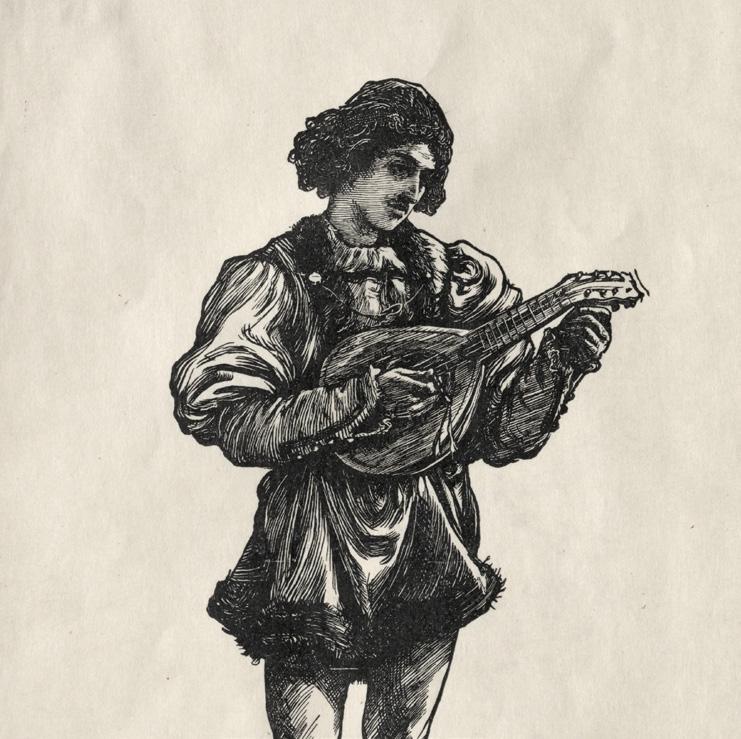

The reason the French language has endured as that of love is down to both its phonetics, vocabulary, and grammar as well as historical precedent. It’s what linguists call a euphonic language, a language that is pleasant to listen to and easy to learn, and it’s due to its vowel distribution and rhythm. The sound is pleasing, with lots of soft consonants such as L,M and N, rather than the harsher T or P, as they often don’t stress certain syllables, making it sound sweeter. Historically, French was the language of art, music, diplomacy, and literature. In medieval France, troubadours, poet-musicians, would compose and sing songs of noble love dedicated to women. Initially written in Old Occitan, and then Old French, this evolved into the French we know now, setting the stage for French as a love language. As the Renaissance arrived, French became the language of diplomacy and literature across Europe. All aristocratic families were expected to learn and speak it, and it was used in art, music and theatre, cementing it as the language of sophistication and elegance. However, there was a more negative side to French love. ‘La loterie d’amour’, or ‘the lottery of love’ was an old custom that involved single people, both old and young, going into their houses and standing at windows, calling out to people on the opposite side of the street until they were matched with someone. However, if the man did not like his new partner, he could reject her and try his luck again. The women who suffered this would get together and make a large bonfire, where they would burn images of their men, cursing and abusing them. The practice was banned by the French government because things got so bad, they worried it would cause serious public disorder.
plane down due to their creation of drag, increasing air resistance. Thus, no landing gear, engine failure, no reverse thrust, no flaps and a concrete wall at the end of the runway created a disaster.
Since the 29th December, there was an accident in Washington D.C. where American Airlines Flight 5342 collided with a U.S. Army Black Hawk helicopter upon its decent into Ronald Reagan Washington National Airport (DCA), killing 67. It is the deadliest U.S. aviation accident since the 12th November 2001.
Many plane crashes happening in a short space of time stokes fear of flying and increases question into aviation safety. However, it is paramount to keep it in perspective: on average there are 100,000 flights a day with up to 10 million people travelling a day, so on the day of publishing there will have been 4.5 million commercial flights since the 29th December, transporting around 450 million people in that time. The likelihood of a plane crash remains astronomically low. However, increased access to media, and social media as well as the accidents happening in Western countries has more people worried to fly and aware of avaiation acidents than ever before.
Agata Koralewska, Deputy Editor, explains where our Valentine’s flowers come from
RECEIVING flowers on Valentine’s Day may be seen as an innocent tradition that celebrates love and dedication to one’s partner. However, there is a dark side to buying such a gift on that special day. The route that flowers take from being cut to appearing in British shops could, in many cases, be a long, complex and exploitative process for people employed by the blooming flower industry in Kenya.
The Kenyan flower industry has quickly grown into being one of the largest in the world, with its flower export contributing to around 1 per cent worldwide. Flowers from Kenya are sold in more than 60 countries. This line of production can be seen as a major opportunity for employment, counting roughly 100,000 direct employees and over two million indirect employees. It could be said that it is a positive force for the country’s

economy, as it generates employment opportunities and contributes to 1.25 per cent of national GDP, as well as attracting foreign investors.

100,000 DIRECT EMPLOYEES AND OVER TWO MILLION INDIRECT EMPLOYEES
Some criticisms of the sector have been voiced, bringing up that fact that the main working demographic of the sector are women and questioning the social dilemmas that might arise in terms of their fair treatment and the threat of them being exploited. Research conducted by Working Women Worldwide in 2007 has mentioned very low wages, sexual harassment, taking advantage of casual workers and poor safety due to frequent use of pesticide spray as issues in the industry. In terms of environmental impact, some farms are trying to implement organic pest control methods to take rapid climate change in Kenya into account. It is also worth considering the carbon emissions that long-distance production generates.
The Kenya Flower Council is an organisation that considers all those issues and tries to bring about ethical and safe flower production in Kenya, fostering a healthy working environment and caring about societal impacts on local communities. The industry might see hope for change with more awareness on its controversies raised by the media and with the help of voluntary associations like the Kenya Flower Council.
International writers highlight various traditions of love from Iraq, South Korea and Wales
IN Iraq, particularly among Iraqi Kurds, Valentine’s Day is celebrated as the ‘Feast of Love.’ This tradition, deeply rooted in Kurdish culture, honours love on the 14th February. The celebration centres around the decoration of red apples, symbolising the Biblical love story of Adam and Eve. Rather than representing the loss of paradise, these apples are believed to bring prosperity and love. The apples are decorated with cloves to create intricate patterns such as hearts, roses, or simple messages like “I love you.” These decorated apples are then gifted to loved ones as a token of affection and a sign of deep emotional connection. This unique tradition highlights both the cultural and spiritual significance of love in Kurdish society, making Valentine’s Day a meaningful and cherished occasion.
Antoni Kalduski
THE most notable difference between the UK and South Korea in their celebrations of love is the fact that women traditionally give flowers and chocolates to men instead of the other way around.
Regarding the day itself — the majority of us know Valentine’s Day, the day of celebrating love, to take place on the 14th February. The following month, however, South Korea celebrates ‘White Day’, taking place on the 14th March; those who received gifts the month before, reciprocate by giving back to their Valentine.
The month after, on the 14th April, South Korea celebrates ‘Black Day,’ during which those without a Valentine or a partner get their own respective day. This ensures that everyone is included in the celebrations, even if it means simply taking a day out to do some self-care and eating chocolate with a cheesy RomCom in the background!
Magdalena Kanecka, Online International Editor
WHILE modern day Wales celebrates most holidays in the Western calendar, their main festival of love isn’t Valentine’s Day but instead takes place on the 25th January. This day is dedicated to the Welsh’s own saint of love: Saint Dynwen. This cherished figure led a life overshadowed by heartbreak — with her father forbidding the marriage to her true love. The tale continues that Dynwen was then granted three wishes by God including help for all lovers across the land. Beautiful, yet tragic, she then devoted the rest of her life to religion becoming a nun, with her most famous saying being “nothing wins hearts like cheerfulness.” The Welsh celebrate St. Dynwen through the gifting of love spoons to their beloveds. Traditional love spoons are carved out of wood by men and display intricate patterns with meanings and symbols — like a diamond for good fortune. This celebration of love captures the nation’s passion and fiery spirit!
Grace Roberts
Henry Anderson, International Editor, interviews Mattie Kenright about his experience thus far studying
THIS week’s Exeter Abroad article looks at the experience of Mattie studying in Pau, a mid-sized town in the south of France known as the “The door to the Pyrenees”. When he first arrived, he felt somewhat hesitant about the town. Pau is small, with 78,000 people, smaller than our own Exeter, and he worried that it would be too quiet. He admits now he was wrong, “the town may be small, but I do feel like there is a lot to do. There are lots of bars and restaurants, lots of opportunities for day trips, and the mountains are just an hour away.” In fact, its small size and its proximity to the mountains were two things that drew him to the town. “I saw it on the list and was intrigued, so I searched it up. I liked what I saw, and I applied.”

The town is beautiful, he says, with old French architecture, a castle, and a boulevard that looks over the mountains, where he often goes to read in the evenings. It is clean, well-kept and with plenty of trees. Despite being near the mountains, it is also mostly flat, situated on a plateau, and the weather is often sunny and warm. What is fantastic is the public transport. “I was really struck by how good the buses in Pau are. They are cheap, it’s very easy to get into the centre with them, perfect for students. They also get you right to the doorstep of the university.” All the nearby cities, such as Toulouse, Bayonne, and Bordeaux have great transport networks, with metros, trams and buses, and are well worth a day trip. There are also lots of places to eat and drink. It has its fair share of French bars, which usually serve wine rather than the more common beer in the UK, with local specialties like Basque cider, and Jurançon wine. Apart from these, there are also Spanish bars, Irish pubs and even an English pub, which Mattie says he
likes to go to when he is feeling a little homesick to play some pool and darts. Price wise, Mattie seems to think life there is a bit cheaper than the UK. The supermarkets can be a bit hit and miss, and their stocks different, but in general alcohol and eating out feels more affordable.

The major drawback Mattie sees with France is the lack of societies. The concept of an English university society run by students does not exist there. There are sports teams and sports courses, but it is all run by the University. However, the University does offer skiing
and mountain hiking day trips which he does regularly. “They are both really easy to do, fun and I would say quite affordable.” To take part, you only have to sign up at the sports office, pay your fee (10 euros for hiking, 25 for skiing), and then be at the bus collection point on Saturday morning. “It’s all included, except maybe a packed lunch. For the skiing, they provide all the equipment, transport and a ski pass. There are lessons in the morning if you want them, and then free ski in the afternoon.”
When it comes to academic work, Mattie, who studies History and French, finds it hard to pin down the difference between the UK and France. “I would say I probably work more, but it’s fewer readings and more exercises. They do seminars, but there is a lot more group work, with oral presentations, discussions, exercises and tasks.”

THEY DO SEMINARS, BUT THERE IS A LOT MORE GROUP
Finally, he says everyone has been incredibly welcoming and friendly. “You mix mostly with international students, and the University is excellent at organising the inductions. The international students are all friendly and want to meet new people, and you all quickly become friends. The University is also very welcoming, and we even had the mayor of Pau (now the Prime Minister of France) come and meet us and welcome us to the city. It felt very special”. As the contingent is small, he feels well looked after, always knowing who to go to for help.

Julia Szewczyk discusses Musk's Tesla: Not quite an asteroid, but an excellent example of space mischief!
ELON Musk can not seem to keep himself out of the news lately, whether it's his controversial dabble in US politics or, more recently, having one of his space projects mistaken for an asteroid.

Elon Musk cannot seem to keep himself out of the news
On the 2nd January, the International Astronomical Union’s Minor Planet Center announced the discovery of a new asteroid. 2018 CN41 was orbiting 150,000 miles from the Earth, which is closer than the moon’s orbit and would classify it as a near-Earth object. But before anyone could start worrying about the idea of an incoming apocalyptic collision, the MPC issued a statement announcing that “the designation 2018 CN41 is being deleted and will be listed as omitted”, due to the apparent asteroid actually being a
car. More specifically, Elon Musk's cherry-red Tesla Roadster.
The SpaceX CEO famously sent his car into space on the 6th February 2018 as part of a test launch for the company's rocket — the Falcon Heavy. Commenting at the time of the launch, Musk explained the decision as a bit of fun as “anything boring is terrible, especially companies, so we decided to send something unusual, something that made us feel." In the driver's seat of the car sits a suited-up mannequin called 'Starman', named after the David Bowie hit by the same name. It also has its own website allowing those interested to track its orbit around the Sun. At the time of writing, Roadster is 239,298,658 miles from Earth and is moving away from it at a speed of 6,136 mph. We are now seven years into Roadster’s time in space and many wonder what is next for the car.
Elon Musk currently has no plans to bring it back down to Earth. In fact, before the launch, he speculated that Roadster would stay “in deep space for a billion years or so.”

Roadster is 239,298,658 miles from Earth, and is moving at a speed of 6,136 mph
As for whether it will collide with something, researchers don’t think this is likely anytime soon. Speaking to BBC News , Dr Rein, an assistant professor at the University of Toronto said, "this thing will be in space for several million years before it hits anything." The current estimate stands at a six per cent chance of the car colliding with Earth, and a 2.5 per cent chance of it hitting Venus in the next million years. However, there really is no cause for concern as if the car was headed for
Earth, it would most likely burn up as it passed through the atmosphere and would never actually reach the ground. This is not the first time the MPC has mistakenly labelled an object in space as an asteroid. From the start of 2020 to the end of 2022, four spacecraft were added to the asteroid record books and subsequently deleted. Some astronomers are therefore using this seemingly harmless mistake to highlight the growing number of untracked objects and space debris orbiting the Earth. According to the Natural History Museum, there are currently 3,000 dead satellites and around 34,000 pieces of space junk larger than 10 cm littering space. This growing number of untracked objects could hinder future efforts to protect Earth from potentially hazardous asteroids as well as possibly throw off statistical analysis of the threat they pose. This problem is only
Rexpected to worsen as more countries and companies set out to explore space. So while there isn’t a mysterious new asteroid orbiting Earth, the situation certainly draws attention to how closely we monitor what we send up to space, and raises the question: should those with money be able to do so for a bit of fun?

Charlie Gershinson, Deputy Editor, and Audrey Alvey, Satire Editor, question whether this new planet could be the closest thing to humanity's second home
ESEARCHERS at the University of Oxford have made an exciting new discovery of an exoplanet nicknamed ‘Super-Earth’ that is potentially capable of sustaining life. Located 20 light years away, its proximity to our own life-sustaining planet “means there is hope for future space missions to obtain an image of it," as determined by physicist Dr Michael Cretignier, the postdoctoral research assistant at Oxford who first spotted the planet back in 2022. Scientists have noted that the planet has a mass six times that of Earth and orbits a star similar to our Sun.

"There is hope for future space missions to obtain an image of it”
Dr Michael Cretignier
Since his discovery, an international team of scientists have analysed over two decades worth of data using YARARA, “a post-processing pipeline designed to clean high-resolution spectra of instrumental systematics and atmospheric contamination.” Essentially, this
is a data reduction algorithm that can streamline masses of information acquired by instruments, such as the High Accuracy Radial Velocity Planet Searcher (HARPS), into a more manageable size for scientists. It also increases the accuracy of the information gathered from the data with the help of HARPS successor in Chile — ESPRESSO.
The planet, dubbed HD 20794 d, is placed in the so-called ‘Goldilocks Zone’ of its solar system, meaning it has the conditions and capability to support life. For example, the planet is not too close or too far from its sun and so could theoretically support liquid water, a key ingredient for life as we know it. However, it is too early for scientists to tell if the planet can actually support life. A key reason is the planet’s orbit. Unlike most planets which have a circular orbit, HD 20794 d is elliptical instead. This means that the distance from its star changes dramatically from being placed on the outer rim of the Goldilocks Zone to the inside.
Beyond the potential ramifications of a planet being in the Goldilocks Zone, the discovery helps to create a valuable test case for space projects designed to
detect life in space outside our solar system. Projects like the Large Interferometer For Exoplanets (LIFE) will help to observe the atmosphere of Earth-like planets and its capability to support life. HD 20794, the star in the system, has also been noted by astrophysicists as “not an ordinary star.” Scientists have observed the luminosity and proximity of the star to Earth, which can further aid scientists in their discoveries.

The discovery helps to create a valuable test case for space projects designed to detect life in space outside our solar system
Dr. Cretignier said about the discovery, “while my job mainly consists of finding these unknown worlds, I’m now very enthusiastic to hear what other scientists can tell us about this newly discovered planet, particularly since it is among the closest Earth-analogues we know about and given its peculiar orbit.”

Have you heard of
Ella-Jade Smith, Sci-Tech Editor, ‘deep’ dives into the latest developments in Artificial Intelligence
MOVE over ChatGPT, AI development is no longer just about intelligence, it is about who can do it faster, cheaper and smarter. China’s newest contender, DeepSeek, is making Silicon Valley sweat.
The rapidly evolving landscape of Artificial Intelligence (AI) has seen China develop its own generative AI software, DeepSeek. The software has emerged as a formidable contender, challenging the current Western model, ChatGPT. DeepSeek has garnered global attention within the technology sphere for its advanced features, and capability to deliver these at a fraction of the cost, prompting discussions of its potential to revolutionise the AI industry.
DeepSeek’s AI model, ‘R1’, has been praised for its efficiency. In comparison to existing models, which require extensive computational resources, DeepSeek employs a ‘Mixture of Experts’ (MoE) model. This mechanism enables the AI to route queries to specialised segments of its network, activating only the components necessary for performing the provided task. Utilising the approach of an MoE provides a host of benefits, from enhancing processing speeds
to reducing energy consumption. Recent reports demonstrate that DeepSeek’s model can operate effectively using only around 2,000 specialised chips; ChatGPT, in comparison, requires upwards of 16,000. Moreover, DeepSeek’s development also boasts economic efficiency, costing less than $6 million for its creation thus far.

DeepSeek employs a ‘Mixture of Experts’ model, dividing the AI into sub-networks
The Introduction of DeepSeek’s ‘R1’ model has had a profound impact on global markets. Following its release, there was a significant sell-off in tech stocks, leading to a nearly $600 billion reduction in market value for companies like Nvidia, which supply high-performance chips for AI development. This shift has sparked a combination of admiration and concern amongst industry leaders. Microsoft CEO Satya Nadella expressed her praise for ‘R1’s’ innovation. Meanwhile, competitors, OpenAI and Anthropic, have demonstrated their apprehension towards the introduction of a competitor. It has been questioned whether US export restrictions
on the advanced chips that facilitate AI software may have inadvertently spurred innovation in China.

Following its release, there was a significant sell-off in tech stocks.
When tested on its practical applications, DeepSeek demonstrates capabilities comparable to ChatGPT. Upon my own use of the platforms, I was struck by how similar the interface appeared. DeepSeek performs almost identically to ChatGPT, from it’s comprehension of language to generative features. However, like all AI models, DeepSeek is not without its flaws. Users have noted that DeepSeek confidently generates plausible but incorrect information, so if you were planning on using it to get through your upcoming summative, it might be worth finding a more reliable source! Additionally, Deepseek’s ‘R1’ lacks certain developments of ChatGPT. Functions of memory or voice interaction modes are features yet to be developed in the Chinese counterpart. Furthermore, investigations by OpenAI have raised concerns that DeepSeek may have trained its chat -
bot using data from ChatGPT. If this claim becomes actualised, this would violate ChatGPT’s terms of service, leading to discussions of broader issues of intellectual property and ethical data usage within the AI sphere. Meanwhile, security concerns have already led governments, most notably Australia, to implement precautionary protection measures. DeepSeek has been banned from all Australian government systems and devices for its posed national security risks.
DeepSeek’s emergence signifies a pivotal moment in the world of AI. Its cost-effective, efficient model
challenges the prevailing notion that substantial financial and computational resources are a prerequisite for the running of advanced AI software. For competitors, the success of DeepSeek serves as both a challenge and an impetus for innovation, underscoring their need to continuously advance and improve AI. It is clear that DeepSeek has introduced a new dynamic into the competitive landscape of Artificial Intelligence but for students seeking a first, it might be safer to deep-dive into your required readings, as opposed to putting your trust in DeepSeek!

Amy Rushton, Editor-in-Chief, investigates claims that a new genetic study could redefine human reproduction
SCIENTISTS have been engaged for decades in a global race to same-sex pregnancy and now advances in genetic engineering have prompted speculation that this may be on the horizon.
Earlier this year, molecular biologists in China managed to create mice using only male genetic material. These bi-paternal mice, some of whom have lived to adulthood, are the culmination of precise
embryonic stem cell manipulation. In normal fertilisation, genes go through a process called ‘imprinting’. Animals inherit genes from both male and female parents but only one copy of the gene is expressed, with the other half of each pair being silenced. When genetic material comes from two males, both copies can cancel each other out in a process termed ‘imprinting abnormality’, resulting in developmental disorders. Essentially,
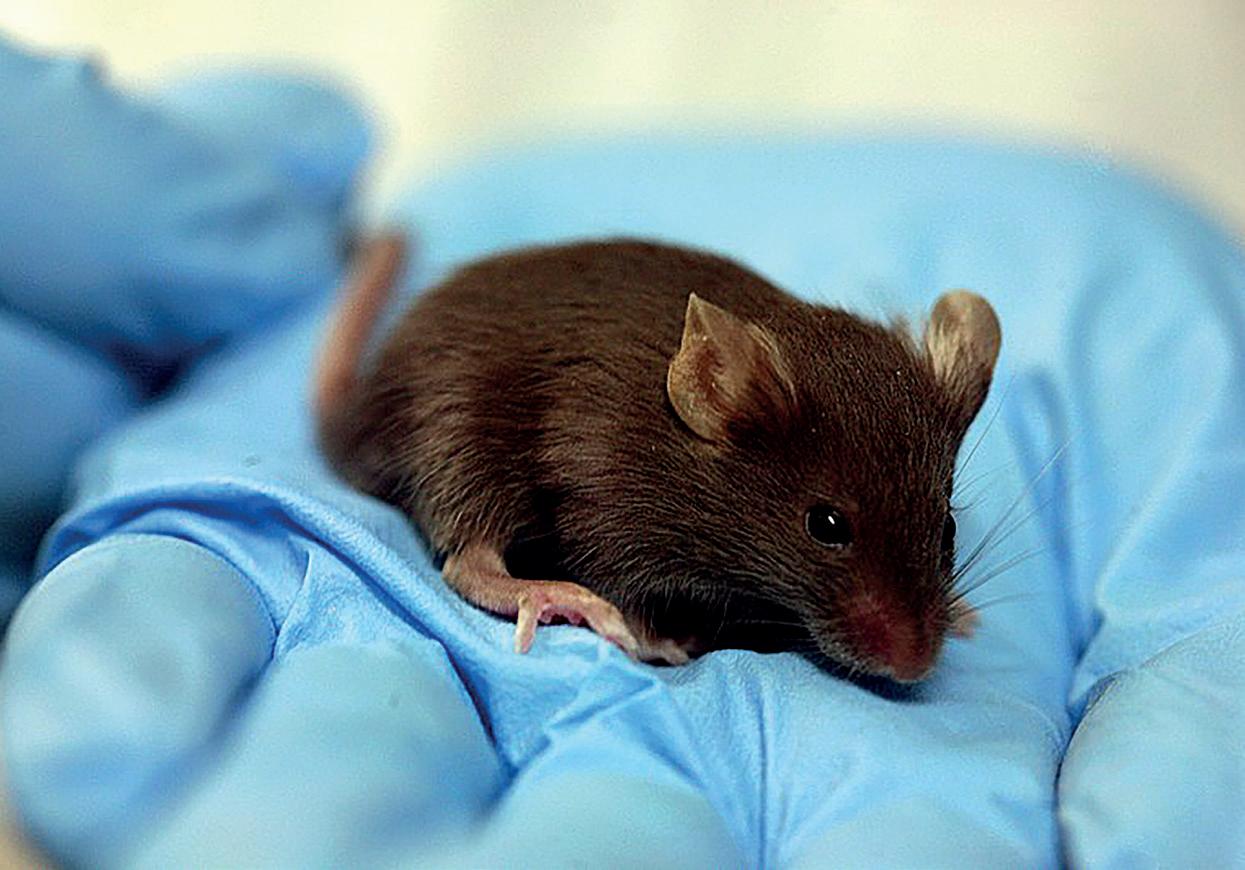
without both male and female imprinted genes, it’s difficult to produce a viable foetus. This is what previous researchers have found. A similar study by UK scientists in the 1980s started in the same way as its more recent counterpart — injecting sperm into an enucleated egg (a female egg with DNA removed) — but when the embryos were transferred to surrogate mice, none resulted in a healthy birth.

Without both male and female imprinted genes, it’s difficult to produce a viable foetus.
The recent study, led by Zhi-Kun Li at the Chinese Academy of Sciences in Beijing, needed to find a way around imprinting by editing imprinted genes out of genomes altogether. They used ‘clustered regularly interspaced short palindromic repeats’ (CRISPR), a gene-editing technology, to manipulate foetal stem cells produced from sperm DNA, focusing on the 20 imprinted genes which are critical for development of the embryo. A combination
of gene deletion, region edits and the insertion of genetic base pairs, produced edited cells which could then be injected into the enucleated egg cells used in previous studies and implanted into the uteruses of surrogate mice. The resulting ‘motherless mice’ were produced entirely by male DNA. These are not the first mice with same-sex parents. In general, it’s easier to simulate reproduction with only female genes than male as there is already precedent in nature some animal species can create offspring that are essentially clones of their mother, without the need for sperm. It’s harder with male DNA, but not unheard of. In 2023, a Japanese study led by Katsuhiko Hayashi, found a way to transform stem cells taken from mice tails and turn them into egg cells which could subsequently be fertilised with sperm, forming mice that can not only reach adulthood but can have offspring themselves.
So what about humans? Unfortunately, this study is unlikely to revolutionise reproduction as we know it. Both approaches, but particularly Li’s use of genetic engineering, have sig -
nificant drawbacks. Only seven of 164 embryos made it to adulthood; they had enlarged organs, lower life expectancies and were infertile. As Li explains, such complicated gene editing has a myriad of ethical and health consequences, “editing 20 imprinted genes in humans would not be acceptable, and producing individuals who could not be healthy or viable is simply not an option.” Knocking out imprinting altogether is — at least for now — too risky for humans.

“Editing 20 imprinted genes in humans would not be acceptable,” Zhi-Khun Li
That’s not to squash any hope of same-sex reproduction; Li’s research is groundbreaking when it comes to understanding of how imprinting works and how future scientists can rework it to fight genetic disease, recover extinct or endangered species and possibly create a path for queer pregnancies.
Conner Myers, Online Sport Editor, reports on Premier League activity in the January transfer window
THE 2024 January transfer window was heavily overshadowed by the Premier League’s new Profit and Sustainability rules. January is typically a hard enough time to sign players already, and the increased regulations on transfers meant spending plummeted, with the League seeing just 17 permanent deals completed.
This year however, January spending is not only back to normal, but clubs that have historically sat back in the mid-season window have splashed the cash.
Reigning champions Manchester City topped the spend ing charts at £180m. A team in crisis, the blues wasted no time in kickstarting their window, immediately capturing defenders
Abdudokir Khusa nov and Vitor Reis from RC Lens and Palmeiras respec-
tively. Omar Marmoush arrived from Eintracht Frankfurt for a reported £59m in an attempt to refresh City’s attack, and a deadline day securing of Porto’s Nico Gonzalez meant Pep Guardiola’s struggling team have been uncharacteristically busy in January.

The blues wasted no time in kickstarting their window

Another team in crisis is Tottenham. Attempts to sign Marc Guehi from Crystal Palace and Axel Disasi from Chelsea to try to solve their defensive frailties failed to materialise, but the deadline day arrival of Bayern Munich’s Mathys Tel on loan may help to address Spurs’s problems at the other end of the pitch, even if the German for-
ward had originally reportedly turned down the move earlier in the month.
Ruben Amorim was able to use his first transfer window as Manchester United manager to begin imprinting his own identity on the team. Full-back Patrick Dogru has come in from Lecce, and Antony, the Reds’ second most expensive ever player, has been loaned out to Real Betis.
Chelsea, the biggest spenders over the past few years, have been unusually quiet this window, focusing more on outgoings and reducing their mammoth squad size. Ben Chilwell and Joao Felix have been sent out on loan to Crystal Palace and AC Milan respectively, and Cesare Casedei will return to Italy after signing for Torino for £12.5m.
The League’s biggest outgoing was Jhon Duran’s in a £64m move to Saudi Arabia’s Al-Nassr. The Colombian striker had been in the form of his career at Villa Park but was unable to lock down a starting spot. Villa wasted no time however in trying to bring in replacements, signing Marco Asensio from PSG, Donyell Malen from Borussia Dortmund, and Marcus Rashford on loan from Manchester United, with Rashford having fallen out of favour

with Ruben Amorim at Old Trafford.
At the bottom of the table, a number of clubs have made signings to try to ensure their survival come what may. Wolves have brought in Emma nuel Agbadou from Reims for £16.6m, Ipswich secured Aston Villa’s Jadon Philogene for £20m, and West Ham have captured Brighton’s young star Evan Ferguson on loan.
Outside of the Premier League, the biggest move was of Napoli’s Georgian star vicha Kvaratskhelia moving to PSG in a £59m deal. Neymar’s injury afflicted time in the Saudi Pro League also

ITom Morris reviews the action in round 1 of the 2025 Six Nations tournament and previews what is to come
T is that time of year again when winter starts to draw to a close, the first signs of spring appear as the daffodil shoots poke their heads up, and the Six Nations begins.
The winter months can be hard, but rugby fans know that by time the latest winner of the annual tournament is crowned, spring will be in bloom. But who will be the latest winner is yet to be determined.
The competition started under the lights in Paris on Friday the 31st January, as France won 43-0 in an exciting and dominant display that showed why they are the bookmaker’s favourites. This was against a weak Welsh side that have lost 13 test matches in a row.


The next match came on Saturday as Scotland got a nervy 3119 win against a spirited Italy.
France won 43-0 in an exciting and dominant display
Scotland had been looking to contend for the title coming into this year’s tournament but were rocked by an injury crisis, the worst of these being to their captain Sione Tui pulotu who is set to miss every game.
Although Scotland started well, they were pegged back to 19-all when Scottish flyhalf Finn Russell gifted the Italians a try.
Antoine Dupont stole the show for France on his Six Nations return, assisting three tries in just 49 minutes. He is the beating heart in the French side’s attack and will be crucial in their bid to win the competition.
their campaign off to a winning start. The final game of the first round was in Dublin, as Ireland overcame England and won 27-22.
Ireland are the reigning champions of the Six Nations and are looking to become the first ever team to win three consecutive iterations of the championship. However, they are without their head coach Andy Farrell, who is leading the Lions tour of Australia this summer. Instead, they are being led by interim head coach Simon Easterby.

But they recovered well and will be buoyed by a hattrick from winger Huw Jones as they got
Although England held Ireland in the first half with fierce defence and took a half time lead, Ireland’s constant pressure eventually let them take control of the match.
England fought well to the end, scoring a couple of late tries to take home a losing bonus point. But Steve Borth-

wick will have to improve his team if they want to contend for the title.
Ireland looked strong and will push all the way to do the three-peat never before seen in the Six Nations. They meet France on Sunday the 8th March in Dublin, where they will have the home advantage in what could prove to be the title deciding game.

The strength of the sports programmes, particularly in rugby, at the University of
play at the Six Nations, with current students Ross Vintcent representing Italy and Immanuel FeyiWaboso hoping to play for England but struggling with an injury. Both will look to have a say in the fate of their nations in the latest edition of this historic competition.
FOR the first time, Formula One will have a full-time female Race Engineer. It is Laura Mueller and Haas F1 Team who are shaking up the usual male-dominated structure.
The German has been with the team for three years and this recent announcement sees her promoted from Performance Engineer to Race Engineer — arguably one of the most important roles within the team as they link the team to the driver. They work closely with the drivers on performance and the set-up as well as the running of the car. Remember the voices you hear on team radio on the telly? You’ll now be hearing a female voice on the airwaves when Haas is wanting to communicate with their new driver recruit, Esteban Ocon.
The French race winner will be joining
the team and work closely with Mueller — both on-track via radio communications but also in the pits to perfect performance.
Alongside Ocon in the driver lineup is rookie Ollie Bearman who has come from the Ferrari junior programme. His Race Engineer, Ronan O’Hare, like Mueller, is also newly appointed to the role and was previously a Performance Engineer.

You'll now be hearing a female voice on the airwaves
This has completely restructured the American outfit, and Team Principal Ayao Komatsu is hoping these series of changes will materialise into a competitive team and race car. Komatsu recog-
nised weaknesses particularly pooled around the race operations team, which became more apparent as the car developed towards the end of last season.
The Head of Strategy at Haas is also a woman — Carine Cridelich will take on this role at the beginning of the 2025 season. These shifts are all part of a wider strengthening structure, and Komatsu picked these individuals based on their talent and what they could bring to the team, rather than their gender.
‘What matters is work’ claimed the Team Principal. He believes Mueller is the best fit to work with the newly arriving Ocon — and her sporting history evidences this! She has both a bachelor’s and a masters in Automotive Engineering from Technical University of Munich and an extensive career working in series
Tsuch as the DTM series, Formula Renault 2.0, and the European Le Mans Series. Although diversity is increasing in F1, it is clear that Mueller was recognised for her work ethic. She joins a fleet of other women in high-profile positions, such as Red Bull’s Hannah Schmitz as their Principal Strategist, or Bernie Collins and Ruth Buscombe, both former Race Strategists for Aston
Martin and Sauber respectively before they turned their hand to broadcasting roles. Whilst Mueller dreamed of becoming an F1 driver herself (particularly to race alongside Michael Schumacher), she is now embarking on a pivotal role within an F1 team. Perhaps hearing her voice on the team radio will encourage young women to work towards their motorsport dreams.

Gracie Moore, Editor-in-Chief, details an upcoming event about gender equality in sport
O mark International Women’s Day on the 8th March, a group of students who all play high-level sport at the University of Exeter have organised an event to raise money for ‘Women in Sport’ — a charity that aims to secure change for women and girls. The students have arranged talks aimed at helping young sportspeople of all ages and genders to understand the challenges of women in the world of sport. Within the talk, there will be discussions with experts in the field of body dysmorphia and gender inequality (among many other issues) to enlighten students to concepts they may not deem serious or even existent at all. Along with this, the students have organised semi-professional female athletes to attend the event to give
their take on their experiences within sport. To name a few, Poppy Leitch of the Exeter Chiefs and head coach of the women’s rugby team at the University of Exeter will be providing some insight along with Lizzie Rayner, a professional triathlete and Ironman 70.3 athlete and Elle Mace — an eating disorder, body dysmorphia and positive psychology practioner.) The students — Millie, Ama, Ethan, Owen and Charles — aim to make as much money as possible for ‘Women in Sport’ to raise awareness of the often unseen struggles that women and girls face in sport. Speaking candidly with Exeposé , Ama said that she had personally experienced internalised misogyny and an unseen gender bias as she is a tennis player at the University who plays for BUCS (the highest
level). Millie added that it’s important at a “sporty uni” to shine a light on an issue like this because in a University setting, managing meal times and maintaining independence are often quite tricky to uphold and this is what the event hopes to address.

raise awareness of the often unseen struggles
The students mentioned that there have been other events related to sport but have been limited to themes such as business in sport. For this reason, they are the pioneers of this kind of event at the University of Exeter and are aiming to set a precedent for the future.
IAma said: “As much as this is about women in sport, this is important for everyone to understand. We don’t just want women involved in this.” Tickets for the event are £5 and can be purchased through FIXR using the QR code below. At the event, there will also be pizza and refreshments.


Lily Fawcett explains the sporting love story between Tara Davis-Woodhall and Hunter Woodhall
T'S the long jump final at the 2024 Summer Olympics in Paris and Tara DavisWoodhall is aiming for gold. It would be her first Olympic medal after coming sixth in Tokyo. In the stands is her husband, Paralympian Hunter Woodhall, sit ting front row and proudly sporting a “Team Tara” t-shirt.

A huge crowd packs out the Stade de France and Tara delivers. With a distance of 7.10, the gold is hers. There’s a beaming smile on her face as she lets herself fall back into the sand, while Hunter is cheering on from the audience. It felt like Taylor Swift’s ‘The Alchemy’ in real life as the crowd watched her find him in the sea of people and leap
into his arms as he cries, “Baby you’re the Olympic champion!”. They were dubbed the ‘golden couple’ when two days shy of a month later, the roles were reversed. Hunter, who was competing in his 3rd Paralympics, also had his sights set on gold. He beat Ger many’s Johannes Floors and the Netherlands’ Olivier Hendriks in

the men’s 400m T62 final. The Stade de France once again saw the Davis-Woodhalls be each other’s biggest cheerleaders as Tara waited amongst the supporters to celebrate this huge victory with her husband. But their love goes way back. They first met while still in high school, at a track meet in Idaho. Hunter had just finished a
race when Tara came over to congratulate him, saying “I don’t know why I have to do this, but I have to hug you”. It was a tweet from Hunter and Tara sliding into his DMs that finally brought them together though, making them one of the most talked about couples in track and field and the centre of a flood of TikTok edits, a telltale sign of modern love.

They were dubbed the 'golden couple'

FROM minute one, Exeter displayed remarkable defensive effort and solidarity propelling them to a crucial victory over Bath. Their grit, determination, and intensity was a level above their southwestern rivals, laying the foundation for a commanding performance.
Speaking post-match, Club Captain Woody Pugh stated that Exeter led “with our defence… suffocated them,” an incredibly accurate analysis. Bath struggled to find any attacking rhythm as Exeter’s defensive organisation shut down key threats and forced repeated penalties. This tone was epitomised by Exeter’s back row: Worley-Brady; Forsythe; Driscoll. All three were utterly outstanding on both ends of the field, but it was their ‘defensive want’ that shone through in their performance. Especially in the first half, it seemed that they were willing to run through walls that their opposite numbers weren’t.
The second half saw Bath upping the tempo. Yet, Exeter’s defensive intensity remained unwavering, with their solid defence limiting a 20-minute Bath onslaught to begin the second half. The back row was again instrumental, dictating the game’s physicality and ensuring Exeter remained dominant at the breakdown.
In set-pieces, Exeter capitalised on their power and strength. They frequently opted for scrums, showing confidence in their pack to dictate the tempo and exploit the fact that Bath were missing some of their key players in the scrum. Similarly, their lineouts proved highly effective, providing a reliable attacking platform and reinforcing their set-piece superiority. Ultimately, Exeter’s victory was built on defensive resilience, a well-drilled back row and a clinical approach to the breakdown and set-piece. Forsythe especially was the heartbeat of the team, the water carrier, he did all the dirty work both figuratively and literally; as the white of his shirt that started the game was completely drowned out by mud at full time.
Reuben Moynihan-Case, Online Sport Editor
IN a game that Exeter won by a margin of 12 points, it’s probably hard to overstate the importance of the 13 that came from the boot of Exeter’s Lewis O’Grady. The fly-half shot out of the blocks, opening the game’s scoring with a fairly straightforward penalty kick inside 10 minutes.
But, if the penalty to open the scoring was a simple kick in front of the posts, the job on his hands (or…well...feet) with his opening conversion of the match was anything but. Standing a few yards outside the Bath 22, practically kicking from the sideline advertising boards, O’Grady was able to nail the kick, converting Harrison Hall’s try and giving the EURFC an 11-0 lead.
This was to be the theme of O’Grady’s evening, always complimenting Exeter’s incredibly well drilled and disciplined defence by ensuring the team in green and white always had a comfortable buffer on the scoreboard.
The man from Dorset continued this form all throughout the second half, not missing an opportunity to put the ball safely between the posts when called upon, as he entered the half time break five out of five from the tee.
It wasn’t until 68 minutes, when he managed to put a kick wide for the first time, that his 100 per cent conversion ratio was dented. A striking of the upright in the last 10 minutes of the game, and a failed conversion as the clock ticked towards the game’s conclusion, meant O’Grady finished the evening with six of his nine attempts landing between the posts.
With over a third of Exeter’s points at Sandy Park coming from the boot of O’Grady, he was more than able to show his reliability and importance to his team. especially when the lights are brightest. Maintaining this level and consistency will be crucial to Exeter ending the season strongly.
RIGHT wingers have a dual responsibility in both defensive duties and attacking play and Exeter’s number 14, Kian Gentry, ticked both boxes at the southwest showdown.
Gentry played a pivotal role in this match, finishing attacking moves and exploiting space on the outside. He constantly showed grit and a willingness to do whatever it took to keep control of the game in Exeter’s hands.
In the early moments of the match, Exeter gained a 10-point lead following a penalty kick, try and conversion. But what really got the crowd going was Gentry’s superb tackle in the 20th minute. Bath was continuously shut down by Gentry’s strong defence, the visitors only scoring their first try at the 33rd minute. The number 14 showed consistency throughout the entirety of the first 40 minutes, never looking tired or showing signs of exhaustion.
The second half looked like Gentry would pick up from where he left off. The 3000 in attendance roared when the right winger slid through the Bath defence with such fluidity. Speed, agility and skilful stepping meant he could outmanoeuvre the Bath defenders and make them lose direction. It was a pleasure to watch. He often ran towards the opposition as if there was nothing in the way, which is the exact mentality that rewards.
After the halftime break, Bath came back with vengeance. Gentry was essential in a moment of concern for the home side. As Bath looked to advance again after gaining 12 points within 20 minutes, Gentry was there to stop them in their tracks. He stood his ground against the opposition’s right-winger and halted any further territory from being gained.
The game could have easily flipped to favour the visitors, the points gap closing down considerably within a short space of time. Bath were desperate to find a way in, and Exeter had to regain composure to ensure no further Bath attacks slipped through. But the right-winger provided the home side with the strong attack and defence they needed to keep the lead and secure the victory.
Although there were multiple line breaks, he never scored himself — but perhaps that was more beneficial. It was refreshing to see that there was no greediness amongst the players, only harmonious cohesion. Post-match, he was awarded Player of the Match.
Connor Myers, Online
Eloise Grainger, Sport Editor